#also this is a very general and summarized version of where this would fall into their concepts of fate and free will to be clear
Explore tagged Tumblr posts
Note
You saw the leak huh? Mat might go to Tanchico instead of the Waste in s3
i hadn't seen it until i got this ask! i looked it up and here's the source: WoTUp video. usual disclaimer that these are leaks so may not be 100% reliable, although i thiiiiink WoTUp has a pretty good track record for accurate leaks. UPDATE: they actually have a spotty track record with leaks and have reported false ones before (such as that faile would be in s2), so we should definitely be taking this one with a grain of salt!
to summarize the video, the only new piece of info is that mat, thom, and min were (allegedly) spotted filming scenes with elayne and nynaeve for the tanchico storyline. (he also says that elayne, nynaeve, liandrin, ispan, and moghedien were spotted filming for that storyline, which is of course not surprising!) HOWEVER, he says that he has no idea where in the season these scenes fall or whether it means mat is *exclusively* part of the tanchico storyline in s3, so at this point we can't say mat is 100% spending the entire season in tanchico instead of the waste - there's still a chance that he's in the waste for a portion and tanchico for another portion.
now, time to speculate! full book series spoilers below. this will be long because my mind is going a mile an hour!
fact #1: mat's hanging and missing eye were foreshadowed multiple times in season 2
fact #2: in this podcast interview, donal referred to mat's season 2 knifestick as a "makeshift ashandarei" (it could be he was just speaking with book knowledge about what a real ashandarei is, but to me it implies that show!mat will also be getting a real ashandarei. besides, the greatest general of the age inarguably needs a better permanent weapon than a knifestick!)
these facts make me still very confident that we will be getting at least 1 Mat Doorway Trip in the show. but that doesn't necessarily guarantee he'll go to the waste - it could happen anywhere. rhuidean is the book version, but falme has a "room of curiosities" per season 2, and tanchico has a museum thingy per the books, so there are several options for where mat could come across a doorway.
unless they're changing the doorway aspect of the moiraine vs. lanfear showdown (which i don't have any reason to believe they will, especially given mat's missing eye foreshadowing, which indicates moiraine will still get trapped in the finn realm and mat will rescue her), then there needs to be a doorway in whatever location the two of them find themselves in at the end of season 3 (or at least that's my best guess for when the showdown will take place). and i doubt moiraine would get over to tanchico, or that she would've carted a doorway from falme to the waste, so a rhuidean doorway for that plotline still feels the most plausible for me. however, there could be multiple doorways in the show, as there are in the books, so mat could go through a different one. so this entire point actually may be moot then, i guess haha but i will keep it in here nonetheless!
here are the overall options i can think of right now - note that i'm assuming only 1 Mat Doorway Trip for now to keep things simpler, but it's not impossible that he might still have 2 trips like he does in the books.
#1: mat goes through a doorway in falme at the beginning of the season (and gets cpr from rand, who went to the doorway to get his own answers)
-> #1A: mat is told by Falme Finn to go to the waste and does so, but partway through the season he heads over to tanchico (perhaps to fetch elayne at rand's behest because of rumors of trouble in caemlyn)
-> #1B: mat is told by Falme Finn to go to tanchico, and he never goes to the waste at all
#2: mat initially accompanies the tanchico crew of his own volition and goes through a doorway there (and gets cpr from someone who is not rand), and he never goes to the waste at all
#3: mat initially accompanies the tanchico crew of his own volition and goes through a doorway there, but he gets spit out of it in rhuidean (and gets cpr from rand, who has conveniently just emerged from his glass columns trip)
#4: mat initially accompanies the waste crew of his own volition and goes through a doorway in rhuidean, but he gets spit out of it in tanchico (and gets cpr from someone who is not rand)
i will be more crushed than you could ever comprehend if Cauthor CPR doesn't make it into the show in SOME way haha but i will start girding my loins now for the possibility (although i do still think it could happen). and no matter what happens, at least we'll always have Cauthor Homoerotic Stabbing Feat. Extended Cradling!
in all honesty, mat doesn't really Do that much in the waste plotline aside from his doorway trip. i would be incredibly sad to lose out on bonding time with rand and egwene (yet thrilled to get mat-elayne-nynaeve bonding - when god closes a door, he opens a window!), but in terms of mat's overall long-term story arc, there isn't anything for him in the waste arc that MUST take place in the waste, i don't think?
but on the other hand, if they're going to add him into the tanchico storyline, they have to have a good reason for it - it can't just be for the sake of having fun shenanigans and bonding with elayne and nynaeve. so of course, my immediate supposition is that this would be absorbing the ebou dar plotline and thus that the ultimate purpose of mat going to tanchico would be to meet tuon.
and honestly................that's a REALLY good idea! i've said a million times over that tuon and her relationship with mat need to be introduced much earlier in the show than they are in the books in order to have enough time for proper development, so combining the wondergirls' two different trips to seanchan-infiltrated west-coast cities into one trip and thereby having mat meet tuon by the end of season 3? that could be a very clever adaptational choice. we know so so little about season 3 so far that i really don't want to get myself stuck into any assumptions THIS soon haha so i'm going to try not to get to hung up on this idea, but i do feel pretty strongly that the best reason (and perhaps the ONLY good reason?) to add mat into the tanchico storyline is if they want to combine it with ebou dar and use it as tuon's introduction. and this would also work very well with mat's doorway trip, because he'd be getting his marriage prophecy in the same season as he meets tuon (though he and/or the audience may or may not not become aware of it until a future season).
but what would a season 3 mat-tuon meeting mean for future seasons? maybe they would just cross paths this season, then go their separate ways for some individual arcs and cross paths again later for the romance to begin. or maybe tuon would get caught up in mat's plotline for season 4 and potentially beyond.
(i do worry that making mat & tuon meet THIS soon could mean they believe they need to aim for the 5-season model instead of the full 8 because i'm not sure what tuon would do for 5 more seasons after this, but i'm already so far out on the limb of speculation here that i don't want to go any further until we know more! and they could certainly invent plenty of stuff for tuon to do seeing as she did not do SHIT in the books and desperately needs to lmao the seanchan heir being a channeler is something that is huuuuuuugely rife with story potential.)
going back to mat, let's think a little about HIS future storylines, in the scenario of him meeting tuon by the end of s3. i think the only other major pre-ebou-dar thing he needs to do is form the band of the red hand, which could be shuffled around to after meeting tuon instead of before. there's lots of possibilites for it - all mat needs to do is participate in a battle where a lot of other people are also fighting. maybe the seanchan try to invade tanchico, and he rallies the locals to protect the city. maybe in season 4 he carts tuon along with him back into rand's plotline, where he forms the band during one of the many City-Conquering Rand Battles the show has available to choose from (cairhien, tear, illian, caemlyn). i do feel hopeful that even IF tanchico stands in for ebou dar, it won't be the point of mat splitting off from rand & the main gang for the entire rest of the series never to return like ebou dar was in the books. especially because he barely does anything of story significance between ebou dar & moiraine rescue heist, so it wouldn't be hard to just move up the schedule of his & tuon's meeting and then return him to his TFOH/LOC storyline.
(............which again makes me worry they're aiming for 5 seasons total because what would MAT do for 4 more seasons if everything but the moiraine rescue heist is accomplished by the end of s4? but, again, don't want to go too far out on the limb of speculation. and 8 seasons has always been a very very lofty goal in today's era of television, so getting 5 would still be wonderful! and so much of books 7-13 is filler & sidequests that i think they could absolutely tell the most important parts of the story satisfyingly in only 5 seasons.)
@butterflydm and i have also speculated that elayne & nynaeve could potentially reunite with the waste crew by the end of s3 or early in s4, in order to give them some bonding time with those characters (particularly rand & aviendha and lan, respectively). so, if mat is in tanchico with them, maybe he could come along! maybe rather than getting split up in a seanchan attack, mat and the girls all kidnap tuon and flee the city together, and make their way back to the rest of the gang.
and finally, on a different note, min's presence in tanchico. intriguing! my first thought was that maybe liandrin kidnaps her from cairhien because she finds out min knows she's in cahoots with ishamael and doesn't want min to snitch, and that's how min ends up in tanchico. this would prooooobably mean she skips the tower coup plotline entirely, which i think is okay because siuan, elaida, gawyn, leane, and possibly logain would probably be enough to anchor that plotline for us. it would also give min the bonding time with elayne & nynaeve she didn't have time for in season 2, and if my tuon speculations are correct, then potentially min would enter her orbit this early as well, which would be interesting. rescuing siuan in the coup is The Only Thing min does in 14 books so it would be funny if the show cut it djkfjg but they can (and already have) invent new stuff for her to do instead, and honestly, min doesn't really fit in with the coup & salidar plotlines that well anyway since she isn't a stakeholder in anything relating to the white tower - none of that stuff truly MATTERS to her character, she just happens to be present for it. so IF she doesn't end up being in that plotline in the show, not a huge loss imo (though of course, she could still make her way to the tower later on, or maybe she starts in the tower but then siuan sends her to tanchico to investigate liandrin or something).
anyway, i think i've reached the end of my speculation for now, although i'm sure i'll think of more stuff later! in conclusion, this is my current mood:

90 notes
·
View notes
Text
The reason i say i have like seven different versions of UF on rotation in my brain is because there are several different Styles of UF that i really like and can never really decide on which I'd consider my Main one, on top of also Lore, which i have a few different ideas for, too.
So like, we have the one i talk abt most often probably, which we'll call AngstFell, because. I'll be honest i love angst and i love doing terrible things to characters. This is the one where they have core issues, supply issues, food shortages, LVlost culling, very complicated and sort of miserable relationships between just about all of the characters. No One is having a good time pretty much, but despite everything, there is still hope...
Then there's how i often mentally refer to it as SillyFell, which is basically just like. If everyone in UT decided to try to be mean and was mostly really bad about it. In this one, things are still generally worse, but having LV is still somewhat uncommon, mostly only guards would have it, and people are generally more sad than they are mean/angry.
And then we have what's probably """closest to canon""" as far as my understanding of it goes, where it's sort of somewhere in between the two prior ones, in that there's definitely still silliness, and their UT selves aren't too far removed from them, but it still can get pretty heavy, and problems aren't as surface level as Silly.
Then we have my """fanon"""fell which is essentially something I've done for most AUs, where i try to imagine circumstances that could possibly, believably (by my own standards and interpretations) make the characters behave more in line with fanon portrayals. This one's way more difficult to summarize since the changes are more character specific, but generally, as far as "seriousness" goes, it falls in a similar place as "Canon"Fell.
And then there's Tale to Fell (v.1) which is essentially based around the idea that UF kind of started as UT, but slowly became UF due to Circumstances like core trouble and slightly different events going down with the humans, both during the war, and with what happened to Chara and Asriel. (End results are similar to "Canon"Fell)
But there's also Tale to Fell (v.2) which is based on the premise of UT slowly becoming UF after Frisk has fallen into the underground due to waaay too many resets and gradual code fuckery. (Opposed to v.1, this is actually a concept I've never seen explored before! Not to say it isn't out there somewhere, but i have a rough draft layout of a potential fic abt it that will...probably never happen bc it would take a lot of commitment lol)
So we have those bad boys, but then there's also differences depending on Lore. Like there's one version i think of sometimes where Papyrus is the older brother, or a version where Gaster didn't make Sans and Papyrus but was actually their adoptive uncle, and another with Gaster Papyrus where, as it goes, the incident that "shattered" Gaster created Papyrus, one where Undyne knew the bros as kids briefly, one where Asgore's just Terrible for like, no real reason, like. There are a lot of ways to think about it!!
And that's not even taking into account all of the Fell based story ideas like the psychonauts one, the one where the bros are gb shifters, one where Papyrus is [redacted], one where there's a zombie like plague outbreak that can only affect monsters with LV, one where Frisk winds up living underground with them all for a Hot Minute, and then of course there's the AUs, like Vesselfell, Horrorfell, Heartfell, Lovefell, Invertedfell, Orangefell, that mysterious one I've been mulling and have not talked about at all with Albatross-
Clearly i am very normal about this 👍
#and that's just off the top of my head there's probably more rattling around up there#i NEED to nickname orangefell Papyrus so bad because he’s so cute and i love him#im taking all of them and putting them in a big jar and shaking it and shaking it and shaking it an#it's like 7 degrees here and my nose is cold and I didn't sleep so you can imagine the headspace I'm in right now (/lh)#sun spots#underfell#i will not be tagging this as anything else for now <3
9 notes
·
View notes
Text
A Proper Introduction
This post has been sitting in my drafts for literal months at this point, but in response to the impending collapse of Twitter, I figured it was time to finally make a post about my writing so that I could start advertising on this platform.
So, hello, my name is Saffron (though some call me Becca). I am a autistic trans lesbian polyamorous dragonkin (she/they), and I’m a writer. As of right now, the bulk of my writing is available for free online. My main projects are my web novels, which I typically write two of at any given time, releasing chapters every other week on a regular schedule. The publicly available chapters of my novels are available in three places: you can read them on my Patreon (https://www.patreon.com/saffrondragon), on my wordpress page (https://beccawritesbooks.wordpress.com/) or on Scribblehub (https://www.scribblehub.com/profile/9163/saffrondragon/). Warning: Scribblehub is a free story hosting website, so although it has better support structures (bookmarking, ratings, etc) it is also full of weird hentai.
Like I said before, I have a Patreon. As of right now, there are two main benefits to being a patron of mine: at the lowest tier, you get early access to chapters of my books, usually between two and four chapters ahead of the free version depending on how well the writing is going at that time. There’s also a higher tier, which gives access to a collection of short stories I’ve written for Patreon (some of them smutty, others not), and the ability to vote on which short stories I will write next.
And now we get to the reason why I’ve been procrastinating writing this post for so long: now I have to try to summarize all of my various works! The Selene Series: Marcus Farrier is a physics graduate student who gets isekai’d to Selene, a steampunk world where humanity evolved to only have one sex. There, Marcus takes up the name “Emma”, and rapidly gets caught up in the chaotic and deadly politics of Selene, and begins having some revelations about their past, their gender, and how they got to Selene in the first place. The Selene series is actually my longest-running writing project, with four years and two-and-three-quarter books under my belt out of a planned four in total. Currently on hiatus, but I will return to it someday.
The Earthborn Emissary: Alex Sierra is living a normal life, with their girlfriend Miri and their best friend Quinn, until the day they fall ill, go into a coma, and wake up to discover that they’ve just emerged from their chrysalis. Alex is actually an Emissary, an insectoid alien from a species that has been driven to the brink of extinction by a genocide; now, their adoptive parents are going to have to take them into space in search of the other members of their species. My longest single book so far, and the closest thing I’ve come to writing what I would consider to be a “YA” novel. My most popular book, though I don’t quite know why. Currently completed, though I may write a sequel someday. The Chained Flame: My most recent and personal favorite of my novels. It’s a loosely-plotted dark fantasy story telling the life of Lindír, prince of the kingdom of Hvalheim, who was cursed at birth to have the body of a dragon. After growing up in the castle dungeons, Lindír finally finds his freedom, and ends up travelling the North as a wandering entertainer, a savage raider, a royal champion, and more. A very tragic book dealing heavily with the theme of traumatic upbringings. Also features a dragon protagonist who does not at any point become human, nor does he particularly want to. In-progress as of the writing of this post, but barely a week away from completion. I also have a couple of short stories posted, as well as two erotic Locked Tomb fanfics on my AO3 account. I generally post new chapters of my novels every second week, Selene updating on Thursdays and Chained Flame updating on Mondays.
So yeah, that’s what I do for a living! I’ll probably start making announcement posts for new chapters, both in public and on Patreon, as well as any Patreon exclusives, votes, or anything else writing-related that I’m doing. Indeed, I might be making some more posts later today, so keep an eye out for that. Thank you in advance to anyone who spreads the word, and extra thank you to anyone who actually goes the extra mile and starts supporting me. To all of my followers who aren’t interested in my writing, you can block the “becca writes books” tag, which will cover all of my writing-related posts.
24 notes
·
View notes
Note
okay okay i’m intrigued — give me your best pitch for why i should make nuestra parte de noche / our share of night my next fucked up read 👁️👂
(hope you don't mind if I answer this publicly, I have a strong emotional attachment to this book and want everyone to read it--if you'd rather it was private let me know & I'll delete it!)
SO. this book is thee most fucked up thing I have read in a while, which is saying a lot because Mariana Enríquez made a whole ass career out of writing fucked up shit (her short story compilations are also very much worth a look). it is pure undiluted Latin American anguish. that part is... difficult to explain, since it's such a cultural thing, but essentially: Our Share of Night takes place primarily in Argentina, and the plot is heavily heavily informed by both colonial history and the history of military dictatorships and the crimes against humanity committed during, how that shaped our society & culture. many of us carry a great deal of generational trauma still and it's in books like hers where that trauma... shines, so to speak, and if you'll forgive the clumsy wording. it's raw and bloody and painful and unapologetic about all of those, but it's handled very, very well.
now, as a word of warning before I get into what the book is about and potentially make it interesting: this book contains some VERY HEAVY SHIT. Enríquez does not pull her punches. I am hesitant to spoil it because it's a book that does not deserve to be spoiled, but. there's a lot of body horror, a lot of violence, a lot of harm done to children, a lot of abuse--again, all handled tastefully and within the context of allegories or even direct references to colonialism / military violence. but it is a lot. so be warned.
the story itself is also difficult to summarize because, again, I want to spoil as little as possible, but: it revolves around Juan, a man who possesses extraordinary abilities to communicate with things such as the dead, demonic beings, and an entity known as "The Darkness" (keep in mind I read this book in the original Spanish & I don't know how that was translated--in my version it was "La Oscuridad"), and his son Gaspar who deserves the world, baby boy, baby. Juan is a very profoundly fucked up man. he is the poster child for Does Everything Wrong Always All The Time. he is bitter and full of both rage and sick, twisted love and is one of the best protagonists I've seen in ages, by which I mean that he sucks so fucking bad. I don't want to predispose anyone against him by saying this BTW, I think his suckiness is a feature and embrace it lmao
Juan is part (well, not really, but for the sake of simplicity we'll say that he's part of it) of a TREMENDOUSLY FUCKED UP organization called the Order, and throughout the whole book his goal is to protect Gaspar from being exploited and abused by that Order, like Juan himself was. remember how I mentioned above that many people in Argentina are still affected by generational trauma? yeah. this is Generational Trauma, The Book.
it's about not wanting to repeat behaviors, about breaking cycles, about not wanting to fall prey to the people that hurt you but hurting everyone around you in the process because all you know how to do is hurt, lash out, be cruel and vicious. it's a book about how far you'd go for the people you love and how far is too far and can you come back from too far? it's about there's always someone worse and about how sometimes you're that 'someone worse'. it's a book about blood in a country that's been bled dry, multiple times over.
if I've piqued your interest (or anyone's!) then please please feel free to DM me with more questions--or with any reactions if you do choose to read it--because I love this book so fucking much I would talk about it forever if I could, but I would never forgive myself if I spoiled it for someone else because it's... an experience, lmao
(note: considering the subject matter, I would recommend that people who don't know anything about the 1973-1983 Argentinian dictatorship read up on it, even just a little bit, because it is relevant to truly understand what the author's trying to express. it is somewhat of a plot point even. I don't think you'd be lost, per se, if you went in not knowing anything, but you'd definitely miss out on some stuff that makes it deeper and more harrowing, I feel. knowledge of what we mean when we say 'los desaparecidos' / the disappeared is, I'd say, pretty important.)
#Maia speaks#it has SO many scenes where I had to stop reading for a bit to collect my thoughts because I was REELING from what I'd just read#when I finished it I stood up and went to lay flat on the ground. just contemplating.#I still vividly recall several of the Most Fucked Up scenes. rewired my brain and I don't say that facetiously
9 notes
·
View notes
Text
blog post #3
Little Red Riding Hood:
The story of little red riding starts with a young girl who was gifted a red hood by her mother, hence the name. They lived near the woods and the mother sent little red riding hood to bring wine and cakes to her grandmother. Her grandmother was very sick, and she only lived an hour away by foot through the forest. Her mother emphasizes that little red riding hood needs to stay on the path because the woods can be a very dangerous place. On her walk there she ran into a wolf. The wolf was very friendly, and the girl told him where she was going. The wolf tricked her into going off the path and he went to the grandmother's cabin before her. He went inside and ate the grandma whole. He then continued to get dressed in her clothes and waited for little red to come and see him. By the time little red riding hood was there she could feel something was wrong. Once she saw the grandma and how different her features are she was scared. The wolf attacked her and ate her whole. Ways away a lumberjack heard the screams and went to see what happened. He found the wolf asleep and cut him open to see if they were still alive. Little ride riding hood and the grandma were still alive and managed to escape and get back at the wolf. Little red riding hood met another wolf a few days later and learned her lesson. Her grandmother and her were able to protect themselves and kill the wolf. This story started off by being told orally and passed down through generations. This was how most tales originated. This version of the story was a part of the grimm’s fairy tales. These brothers took stories and tales directly from common villagers and created a piece of literary artwork. The story has changed over time and there are many different versions. The story I summarized was one of the first versions, but it can be hard to know for sure which one was the most accurate. There are versions where little red riding escapes the worlf on her own without being saved by a lumberjack, and there are also versions where she doesn’t survive.
Rapunzel
The story of Rapunzel starts with a husband and wife who wanted to have a child. They lived in a house and right behind it was a garden owned by a sorceress. The family finally got pregnant, and everything seemed to be working out. One day the mother saw the greens, Rapunzel, in the garden behind them. She could not stop craving the greens and felt like she was going to die without it. she begged her husband to steal some from the sorceress or else she would die. The first time the plan was successful, and the husband gave it to her wife so she felt better for awhile. The second time he went back he was caught. The sorceress was enraged and made him a deal. She said she would allow him to take the rapunzel forever if they gave up their child the wife was going to have. He agreed. She named her new daughter Rapunzel and locked in her in a tower in the woods. Rapunzel had very long hair and the only way anyone could get into the tower was by climbing her hair like a ladder. The sorceress would do this often and would always check up on her. One day the king’s son overheard Rapunzel singing, and he called out for her to let her hair down. He went up there and fell in love with her. He asked her to be his wife and every day he would come and visit her with silk for her to make a ladder so she could come down. The sorceress found out and was infuriated. She cut off Rapunzel’s hair and took her to the woods to suffer. Then she waited for the prince’s arrival. She used Rapunzel’s cut off hair to trick him into climbing into the tower. Once he saw the evil sorceress he felt at a loss and threw himself out of the tower. He survived the fall but landed on thorns that poked his eyes out. He spent the rest of time being depressed until he heard a sweet voice in the woods one day. He was reunited with Rapunzel and the twins that she gave birth to while he was gone. He cried of happiness and his eyesight returned. The story of Rapunzel was also one of the original stories from the Grimms fairy tales. These were oral stories that were passed down from generations that were turned into a piece of literature. This story went from being told orally, to literature, to a movie. The story has changed through each different convention. In the movie the story is not scary and is for children to watch. The movie changed the characters compared to the original version. The husband and wife were the king and queen of a kingdom. The man that found Rapunzel was not a prince but a thief. He did not go blind, and he in the end cut off Rapunzel’s hair. The movie also incorporated more magic than the original and made Rapunzel’s hair have a power. This is a prime example of how stories can be taken and changed to create something else.
sources
1 note
·
View note
Text
Divination in the Luxon Religion—A Form of Astrology
A brief summary on the history of astrology here—many traditions of astrology originate in Mesopotamia and Egypt during the ancient period, beginning in the Mesopotamian region around 2000 BCE. Astrological interpretations were not causal in anyway—the movements of celestial bodies didn’t cause events, they were viewed as a kind of “heavenly writing” that was placed there by the gods in order to convey messages. In Egypt, different techniques arose, but with similar significance.
These two traditions were essentially pulled together to create what became Hellenistic astrology and was transmitted to Indian to create Vedic astrology, and so on and so forth as those two primary lineages were passed down. (Western astrology has shifted greatly over time as it has been translated as the boundaries of empires in Europe changed, whereas Vedic astrology has largely remained one unified and further refined tradition.)*
In Exandria, like other campaign settings, the gods in fact communicate directly with their followers, especially through priests who get either directly worded messages or fairly clear omens about what is to come (we’ve seen both from Melora). Additionally, the gods have in the past been present physically, and the existence of the Divine Gate is well documented and researched—probably the most well-known effect of the Calamity.
In that regard, you wouldn’t inherently need to create some sort of astrological system to interpret omens, because you can call up your god (or have a priest call up your god, if you’ve got enough money for it) and ask. This isn’t to say that people without that money would not look for other omens, but they probably would not have a centralized practice considering how word travels in Exandria and how necessary that kind of practice would be.
However, then you get to the Dynasty. The Luxon is not a deity that speaks to anyone (as mentioned by Essek in 91, and confirmed by the EGTW in the Lesser Idols section, since our boi is unreliable at best). The EGTW also says that higher ranking members of the religion divine omens from the beacons, and the description of Skysibil Abrianna Mirimm says that she is a ‘talented diviner’ in addition to being the Umavi of her den. Her title, notably, also literally means “heavenly prophet.”
And if your people had just come aboveground after centuries if not millennia in the Underdark, and you were predisposed toward night but followed a god seemingly made of light that is believed to have come from beyond this world before settling upon this rock, it would stand to reason that the first place you would look for messages would be in the movements of the stars.
And the thing being, that the people who developed the techniques of that interpretation and recorded patterns in relation to events would be both invaluable to the political structure of the Dynasty as well as honored authorities within the Luxon religion, meaning that the practice would probably be largely institutionalized and intrinsic to the operation of the government—using omens to choose times to act or to predict tragedy, for example.**
As an additional note, astrology until the Renaissance period was tied into other natural sciences—Ptolemy famously wrote the Tetrabiblos in order to reconcile astrological techniques with his concept of cosmology. This was in addition to its association with the Greek humors and softer sciences like political science.
One thing that interests me about this is whether or not they would use this for individual people (natal astrology) or only larger or more situational purposes. I think it would depend on the Dynasty’s interpretation of fate versus free will, which is a major pressure point in the field of astrology especially in modern times, and I imagine it would be in this situation as well given the ways in which the Dynasty looks to manipulate fate.
However, I would tentatively suggest that there probably is some form of natal astrology, in which an individual can be given guidance on coming events or influences specific to them and alter or navigate those things as such—every time something of this sort has been mentioned in canon, it is approached more as something to manipulate rather than something that simply doesn’t exist, so I would guess they have a middle ground approach to that concept.***
So I could absolutely see the primary method of divination in the Dynasty being astrological! It would make sense given the parameters of their religion and why astrology has in the past been developed, and symbolically I think they would probably vibe really well with it.
[Notes and citations under the cut.]
* This post does not touch on Chinese astrology, primarily because it works on a system of years and does not track the movement of constellations, working instead with twelve-year cycles aligned, I believe, in part with the cycle of Jupiter. This is specifically focused on tracking the movements of the constellations and celestial bodies. ** This is something that some in power still use in the real world! Look up Joan Quigley, who was the personal astrologer for the Reagans, and then think about how effective Reagan’s actions as president were in becoming embedded in American society. For good or bad, astrologers absolutely still effect that kind of thing. ***This is where many contemporary astrologers fall as well!
[Most of the historical context comes from work done by Project Hindsight, a major translation project in the 1990s/2000s that worked on historical Greek documents that had been compiled by academics but never translated, and curated and distilled by Chris Brennan in Hellenistic Astrology: The Study of Fate and Fortune. This work has also been contributed to by Demetra George, both in her work in translation and her book Ancient Astrology in Theory and Practice, and translations of medieval texts from Latin and Arabic by Benjamin Dykes. For more information on Joan Quigley, reference episode 68 of the Astrology Podcast with Chris Brennan and Nick Dagen Best.]
#critical role#cr meta#kryn dynasty#also essek was one of those people who went hard into it to disprove it in order to support his agnosticism and was mad when it worked#and now chalks it up to patterns and logic but still just falls back on looking at it when he's stressed#(yes I will be writing that one-shot before you even ask lmao)#listen this isn't even just me peddling astrology cuz I do not like pushing it on people cuz it's not everyone's cup of tea but#it just makes sense#(but also if you're interested in hellenistic astrology check out those works cited and come ask me for recs lol cuz I've got 'em)#tbh if you're interested in any astrology come ask me for recs cuz I've probably got 'em lmao#this would be most similar to astrology practiced in the hellenistic era though which is why that is what I reference#also this is a very general and summarized version of where this would fall into their concepts of fate and free will to be clear#maybe I'll write another post on that cuz I think it's an interesting topic in literally any situation but it's especially interesting here#given how the wording around dunamis is phrased
49 notes
·
View notes
Text
A guide to Adventure/02′s Crests and how they tie into their respective characters

I find that the Crests are best described as helpful guides to best summarize each Adventure/02 character’s personal arc, especially since both series tend to be a bit overly subtle and benefit from having something with concrete symbolism, but I seriously, seriously warn against oversimplifying them too much; it’s made very clear within the series that the respective Crests carry a lot more meaning than can be summarized in a single word, and moreover, have different nuances between the versions in Adventure and 02 as well.
With that in mind, let’s take a thorough look and dig in!
Overall
I think one of the more misleading (but, unfortunately, tempting) patterns of thinking to fall into when it comes to things like Crests and Digimentals is that the series is supposed to follow some pattern of “the kid lacks enough of the trait, then character develops into someone who has the trait, then their Crest/Digimental responds”, which is...not how it’s actually supposed to work.
If you look carefully at a lot of the character arcs in Adventure and 02 are less about “gaining” those traits as much as realizing already existing potential for them -- some of these kids are clearly exhibiting said traits from the very beginning, but don’t entirely have awareness of it or are somewhat restrained from exhibiting it fully, due to having insecurities they need to get over, or lacking awareness. These were all fundamentally selfless and well-behaved kids from the get-go, but sometimes understanding yourself is half the battle! Which is also said directly in the novels: Crests are not about whether you have the trait or not, but your potential for them.
So in other words, even looking through the kids’ “focus episodes”, trying to look at things in terms of what point they instantaneously turned into a different person is going to make you come up dry (and especially once we get to 02, where the "timing” only really matters for the secondary Digimentals). Rather, it’s better to use the Crests as a general guideline of what their overall character arcs are about, but while the Crests and secondary Digimentals ostensibly seem to react at times the relevant trait is best expressed, you’re going to miss out on a lot if you reduce it to only that.
Courage

For Courage in Adventure and its relevance to Taichi, it’s interesting to start with what the Crest is not supposed to mean. Or rather, what it means in a misapplied context. Contrary to how it’s popularly framed, in fact, the SkullGreymon incident in Adventure episode 16 was not about an “inverted Crest” or a lack of the trait, but rather, as defined by “the one who wishes for stability” (Homeostasis) and Taichi in Adventure episode 45, using that courage “for the wrong reasons” and having “the wrong kind of courage”.
Let’s take a look at a passage from the novels:
It was courage, no doubt about that. But unlike the innocent bravery he had shown at the Koromon village to save his friends, something dishonest was also mixed in. One of them was the feeling of making Greymon evolve to Perfect level. And the other was that even if it was for evolution, and even if he felt bad for putting Greymon through this rigorous trial for his sake, he wanted the glory that would come from it. Taichi squeezed his eyes shut. He was prepared for the possibility that he might die.
As it turns out, it is still defined as courage! Taichi does know what he’s dealing with, and he understands the danger and risks he’s putting himself into. It’s just courage for the sake of his own personal glory and sense of savior complex, not for the reason of protecting everyone. The underlying motive is bad, which is what causes the evolution to go haywire here -- but it still does count for our purposes.

In contrast, after this event causes Taichi to lose his nerve, we get the opposite; Taichi not understanding the risks and dangers of what he’s dealing with in the Digital World is what directly leads to his mishap with Sora’s kidnapping in Adventure episode 19. (Note that this didn’t result in a failed evolution; it just wasn’t anything at all.) It’s only in Adventure episode 20, when Taichi is both aware of what’s at stake and is willing to properly put everything on the line for selfless purposes, when he’s able to activate the Crest properly.

And this is only the halfway point! In fact, when you look at Taichi as a character overall, Taichi had always been a go-getter who took bird’s-eye views of the situation (maybe too much), but he’d kept getting into snags and trouble (especially with Yamato) because he sometimes misjudged the scope of what he was getting into. But as we eventually go into the second half and eventually end of the series, Taichi gets a better understanding of what’s around him, what’s at stake, and what he needs to fight for.
So we define Courage as, ultimately, understanding the stakes and being able to assertively stand up against them for the sake of others. Taichi certainly had the assertiveness, but the part about understanding was often a bit lacking (whether it involved needing to take others into account a bit more, or understanding what he was actually dealing with). Of course, he was always someone who was acting in the name of conscientiousness for others, but it’s really by the end of the series where he comes to embrace all of that and fill the role of a true leader.

When we get to 02 and look at Daisuke, we can see that Daisuke has roughly that same end goal of “courage”, but he’s coming from the opposite direction -- he definitely understands stakes, and he cares about others and his surroundings, but boy, he’s lacking in assertiveness. This is why it’s a huge pitfall to think that the moment everyone got their Digimental in 02 was the peak of them expressing that trait, because Daisuke claiming the Digimental of Courage in 02 episode 1 was definitely a show of his potential for getting himself together enough when things became necessary, but there’s still a long, long way for him to go!
If you want to talk about Daisuke for most of the first half of 02, the problem is that he’s...actually a bit spineless. As a very emotionally intense person, he can easily get excited, but the moment something looks intimidating, he makes his intimidation very clear, and the moment someone says something assertively enough, he backs down (especially if that someone is one of his respected seniors). Early-series Daisuke is largely people having to carry him around and him not being able to do much by himself...until, most prominently starting in 02 episode 20 (when he stands against the group’s decision to back down and chooses to go in fighting Chimeramon) and further on into the series, he actually gains some proper will to stand up for what he wants to do, including locking down on his stance on wanting to befriend Ken, and eventually becoming the most obviously resilient person in the group against increasing stakes.

As the beginning of the series showed, Daisuke is very aware when things are dangerous, and he’s emotionally sensitive enough to understand how others are feeling! When Daisuke gains the will to charge into things at the end of the series, it’s not because he’s out of depth or being foolish; after all, at the beginning of the series, he might have gotten much more intimidated at the same thing. Daisuke knows what he’s dealing with; it’s just that he’s got a remarkable sense of resilience, and ability to not deal with unnecessary thoughts or things that’ll keep him from doing what needs to be done. Because, sure, charging in is dangerous, but as he points out, what else are they going to do, squander their only and last chance, or be sitting ducks? So even if he gets his Digimental at the beginning of the series, it’s at the end where we really see the payoff of what kind of person Daisuke becomes -- again, someone who understands the stakes, and is able to assertively stand up against them for the sake of others.
Friendship

If you just want to define “friendship” as “liking friends and being friendly”, Yamato honestly had that from the very beginning; from day one, he was always one of the most compassionate people in the group, and one of the most passionately emotional in advocating for them. In fact, in situations removed from stress, he would even turn out to be rather cheerful and open -- as early as Adventure episode 6, at that! -- so it’s not a mere issue of how well you get along with others.

In fact, Yamato actually lays down the specifics of his real problem in plain words, in Adventure episode 51: it’s not that he’s ever hated interacting with anyone, but he’d been obsessed with not showing weakness by trying to be self-sufficient. In other words, what Yamato needed to realize was his potential for being able to trust, connect with, and work alongside others -- as much as he’d been open about his feelings and passionately emotional from the very beginning, he was still fixated on an idea of self-improvement and being self-sufficient to the point he loathed the idea of dependency on others.
This is why Jureimon was able to get to him in Adventure episode 44: because Yamato was fixated on this idea of “perfection”, the idea of Taichi being better at him in every way (especially in terms of being a better older brother figure to Takeru) ate at him, instead of him being able to embrace the idea that he and Taichi fill in different specialties and can complement each other’s work. This is what Gabumon unsuccessfully tries to drill in during the episode and eventually reaches to him with in Adventure episode 51; because of this, instead of railing on himself for his own flaws, Yamato is able to channel his natural compassion and emotional sensitivity into trusting others to help him and reach out to him.

Likewise, when we get to Daisuke in 02, from the very beginning, Daisuke was always happy to hang out with and appreciate others around him, but he starts off...a bit overly defensive, and his actual way of working alongside the team needs a lot of work. Daisuke indirectly admits in 02 episode 11 that he doesn’t seem to have had a lot of experience having friends, and, based on his behavior for the first half of the series, you can really believe it; he spends a lot of time on the overly defensive end, especially with Takeru, and getting easily annoyed and running in circles.

But in that same episode, Daisuke calls himself out for not understanding Takeru’s feelings enough, and for it, being pathetic. In the end, it’s something Daisuke wants to do better about; even with Takeru having suggested something that seems like a heathen statement to him (potentially putting Agumon in danger of being killed, and later with Patamon), Daisuke realizes that he needed to do better in terms of understanding why they felt that way, and with that, he claims the Digimental.


So as we go further into the series, Daisuke continues to develop further into one of the best friends you could ask for, which becomes extremely vital when he becomes the best friend of none other than Ken, the person who should be last on the bar of befriending anyone in this group. Let’s put this in perspective: an abrasive and overly defensive kid with little experience in having friends accomplished the greatest task of reaching out to a heavily traumatized and emotionally isolated boy who had practically gone out of his way to antagonize all of them for a whole half a series. But Daisuke’s cultivated ability to be in-tune with others’ feelings, figure out what they need the most, and work with others ends up making him a vital presence for not only Ken but also the rest of the group -- and, really, there’s a reason this is the quality he’s arguably known the most for.
Love
First things first: while “love” can be construed to mean a lot of things, the Japanese word here is aijou (愛情), literally “affection”. So it’s not something that should be construed to mean romantic love, and in fact something close to familial or platonic love is much more relevant. "Affection", in this case, means caring for others and providing them proper emotional support and warmth. Certainly, everyone in this cast is good at providing support in their own way, but with all the stress and pain that goes on in this series, it helps to have someone who can help everyone feel cared for.



It’s funny to look back at the earlier episodes of Adventure and realize that Sora actually never considered herself a person even capable of this back then. Her first major episode, Adventure episode 4, even entailed her even trying to pretend to be someone above all of that! Adventure episode 26 even lays it out in words: when Sora reveals that her Crest is Love, Taichi and the others basically react with “yeah, that tracks,” but she herself is incredibly insistent that this must not be the case and she’s a horrible person incapable of love.
So, that’s the thing: she did have affection! She’d been doing it the entire time, she just had absolutely zero sense of self-awareness that she was, because she was so convinced that she was incapable of it. And, ultimately, Sora is best able to express this when she finally properly understands this, seeing Piyomon in the exact same position that she herself was when she’d once argued with her mother, understanding herself -- and her own mother -- to be capable of this, and embracing her own position as a supportive person who can help others.

Sora has a huge mental breakdown in Adventure episode 51, as the stress of the burden of saving the world weighs so much on her that it starts tearing her apart, but the way Yamato and Jou reach out to her involves re-centering her own will in the situation: they’re not doing this because they have to, but because they want to, and are capable. While it’s a thin line, it allows Sora to realize her own agency in the situation, and recognize herself for who she is and what she wants to do, rather than continuing to act like she’s just someone getting strung along with the situation.

When we move on to 02, Miyako comes from the other end of being aggressive, messy, and, at times, an emotional wreck -- it’s initially hard to believe she’d be capable of emotionally supporting others when she’s barely even capable of handling herself. But she, too, also shows very clear signs of having the potential for this from the very beginning, considering that she’s the one constantly doting on others (aggressively doting on others, at that), acting like there’s bubbly hearts everywhere, bringing food for everyone at the drop of a hat, and being constantly motivated by poking her nose into everyone’s business as if going I’m helping!!


As the series progresses, however, we start to see her get a grasp on the group dynamics, and start actively working on keeping everyone together -- notably, she intervenes in 02 episodes 24 and 30 when she notices Daisuke getting antsy about being third wheeled again, she begins actively bidding for better relations with Ken in 02 episodes 25 and 30, and, in general, starting in 02 episode 31, she starts going out of her way to actively reach out to the more closed-in Hikari and Ken through actively working to check on them and help them through their problems. During the Dark Seed arc, she’s seen the most concerned about how Ken's stake in this issue (including leading the roundtable in 02 episode 46).

On top of that, in 02 episode 49, when everyone’s treated to their own personal illusion, Miyako’s the only one who finds her own to make her miserable before needing to be told it’s fake -- because her love for other people is so deep that even when she’s offered a break from all of the overwhelming noise around her, she just can’t bear being alone for that long.
Knowledge
As much as Koushirou’s associated with his computer, his character arc is not about his computer. The computer is an integral part of it due to its relevance to the Digital World setting, and a place where Koushirou can access and analyze the information he needs quickly, but the Crest of Knowledge was never about that. Its definition is given very directly in Adventure episode 24: inquisitiveness, and a desire to know and understand more.

Koushirou is constantly described in the series as “inquisitive” (shiritagaru, literally “having a tendency of wanting to know”). His curiosity is relentless. Once he sees or hears about something he’s interested in, or finds something bothering him, he does not quit pursuing the lead and does everything in his ability to find out. This is also where I really, really have to warn people to not make it too much about the computer, because it’s really not about the computer; Adventure episodes 26 and 28 and 02 episode 33 make it abundantly clear that “heading over to an expert and picking their brain” is a perfectly viable option for him.

This tendency had always existed within him since the very first episode, but the part that develops about Koushirou is how he goes from someone mostly isolating himself from anyone except Taichi to someone who gains a position as one of the most valuable and respected people on the team. Starting with Taichi appointing him to the position of solving the card puzzle in Adventure episode 28, and later putting his skills to use in Adventure episodes 42 and 48 (note that the episode 28 and 42 incidents had less to do with his ability to operate computers and more to do with his ability to make observations and critically analyze), Koushirou is able to better pursue what he wants to know with gusto, culminating in him taking a larger leadership role in 02 and gaining a considerable number of connections.

In the case of Iori, while Iori doesn’t initially seem as insatiable as Koushirou at first, he still does make a number of observations throughout the series and has a penchant for asking curious questions. In particular, however, what makes his character arc work in the second half of the series is that, while his view of the world is too black-and-white, he’s perfectly willing to take his existing values into question when something contradicts them. Iori thus develops a similar “I want to know” mentality to Koushirou, but instead of more technical knowledge, it’s about people and why they act the way they do, and it’s because of this that he’s able to break through to and understand the complicated human being Takeru is.

Beyond Takeru, he continues to take new information into account and continues to press further into things he doesn’t understand, which is how he eventually manages to warm up to Ken, and eventually culminates in how he becomes the crux of Oikawa’s story near the end. Iori continues to push on and insist on why, why, why a friend of his father would choose to do what he did, and it’s because of this understanding that Iori is able to be with Oikawa during his last moments.
Purity

In some sense, the American English dub translation of “sincerity” wasn’t actually entirely off in spirit. The Crest name junshin (純真) does literally mean “purity”, but the sense it’s applied to in Adventure and 02 is mostly relevant to having no malicious intentions and being true to one's own feelings.
Here’s one of my favorite passages from the novels:
Mi–chan was pointing at the front of the bus, where a boy wearing a long–sleeved orange shirt was about to get off. Even Mimi knew who he was. They hardly ever talked together, but he was her classmate, Koushiro Izumi. Mi–chan wanted them to look at what Koushiro was carrying on his back – a wireless laptop. “Isn’t he so weird for bringing that all the way to camp?” Mi–chan sneered with mocking laughter, but Mimi didn’t laugh. She simply didn’t find any reason to.
Mimi doesn’t have any sense of malice or feelings of condescension; she could have completely taken the opportunity to mock Koushirou (a stranger at the time) like everyone else, but she just doesn’t have it in her. Because what would she get out of it?

Mimi is driven by empathy before anything else, and it means that, while she’s usually the first to crumble and take it emotionally hard when things go sour, she’s also overflowing with compassion and has no sense of being rude or inconsiderate to everyone. She’s always respectful of others and never crosses their boundaries, hence why she’s so constantly described as “someone who can befriend anyone”. And the one time she did -- when she was having her worst mental health day, when she’d been stranded for an incredibly long time in the Digital World with no end in sight, and when she finally caved to getting all the luxuries and comforts she’d been demanding -- the stress and guilt of letting down her friends gave her such an immediate mental breakdown that she snapped out of it all on her own, after only one night.


Mimi is the most prominent pacifist out of the entire Adventure and 02 group, and it’s made clear that she hates fighting, preferring to talk things out if possible (to the point where it results in her getting beaten up by Digitamamon all the way in 02 episode 16 because she refuses to fight him). However, her desire to get along with everyone is how she reaches out to Ogremon in Adventure episode 46, and how, in Adventure episode 50, Jou determines that Mimi’s pacifism and desire to help the fight can be reconciled by her using her kindness and charisma to gather together allies, since, again, she’s so likeable and considerate that she’s capable of doing that. By the time we get to 02 episode 25, Mimi is the second person to advocate for Ken being allowed to help (and, unlike Daisuke, she hadn’t even personally interacted with him much before), which ends up being greatly influential on Miyako’s own ability to accept him at the end of the episode.


Speaking of 02 and Miyako, this one gains a really interesting extra nuance, because unlike Mimi, Miyako really hates herself.
Listen to what Miyako says about herself for the entire first half of 02 and you’ll realize that she’s incredibly critical of herself and her own messy tendencies -- in fact, she’s always the one to criticize herself before anyone else, and it seems like her entire sense of self-worth is based on how helpful she’s being to others. (If you think it’s subtle in the series, the character songs completely blow off the lid and feature lines of her basically calling herself good for nothing.) Her receiving her Digimental in 02 episode 14 is her admitting a huge string of bad things about herself -- especially in the sense of comparing herself to Mimi, whom she idolizes -- and admitting that this is “the real me”. 02 episode 18 follows up with her being harsh on herself for her mistakes during the episode, calling herself a “bad partner”, but Hawkmon says that he likes her the way she is.


The reason for all of this is that Miyako, in the end, doesn’t need to change her fundamental personality or completely get rid of all of the messy, aggressive traits she hates about herself so much -- it’s just that she can find a way to support others if she really wants to. This comes to the forefront in 02 episode 31, when, after a whole half an episode centering around her insecurities about herself, she learns that Hikari, with a polar opposite disposition to her, outright envies her ability to be straightforward, and Miyako is eventually able to channel her aggressive tendencies to be able to reach out to Hikari in such a state.

And, incidentally, Miyako being “the way she is” instead of needing to make herself into someone else had always been to her benefit from the very beginning; all of the other kids had shown respect for her from day one, and even outright appreciated her ability to bring cheer and happiness to the group. They’d always preferred her this way; she was simply the one constantly criticizing herself and considering herself useless, she just didn’t realize her own potential. The fact “Miyako makes others laugh” is made a recurring point in 02 episodes 31, 36, 38, and 50 (all the way to the epilogue!), because, sure, she’s prone to panicking and occasionally causing trouble, but it’s that exact bluntness and straightforwardness that makes everyone love her so much, and it’s also a key factor in why she’s one of the earliest in the group to accept Ken, because she has no real capacity for grudges or malice. As much as she’s all over the place, her intentions are always out of a pure-hearted desire to help others, and it ties into how she’s able to become the supportive person she wants to be, in her own way.
Faith
This one’s infamously been one of the most troublesome to translate for all of the fan (and official) translators over the years, but we’ll go with “Faith(fulness)” for now. The word itself is seijitsu (誠実), alternatively translated as Sincerity or Honesty, and the general sentiment is about doing right on principle -- keeping one's word or promise, not deceiving others, doing things in good faith, an understanding one’s duty to others.

If you’ve seen Xros Wars, you’ll know that Kudou Taiki is infamously known for being a character with “Good Samaritan syndrome”, meaning that every time he sees someone in trouble or hurt, he ends up going out of his way to do something, because he hates the feeling of sitting around and doing nothing when he sees someone in need. Jou is basically that, but with significantly less self-confidence and a lot more of a penchant for panic. His borderline self-sacrificial tendencies (throwing himself on a Unimon in Adventure episode 7...) for the sake of helping others had always been there from day one, so in Jou’s case, it’s more of a question of potential; he really wants to be someone who can help others, but he’s often too much of a nervous wreck for it.

Remember: Jou’s supposed to be the oldest in this group, but he’s not exactly the spitting image of a respectable senior. Rather, Jou takes his status as the oldest as a sign that he needs to be responsible for them -- hence why he never hesitates to recklessly throw his life on the line for others’ sake, to the point he arguably even takes too many burdens on himself because he’s that level of self-sacrificial. Adventure episodes 23 and 36 (the latter being his Crest episode) show this off marvelously; he’ll physically throw himself into dangerous situations without a second thought because he feels he needs to keep his word or obligation to others.


In the middle of the series, we get a few interesting revelations about Jou, namely that he actually has no real passion for the prep school track nor the idea of becoming a doctor unless he has his own real reason for wanting it. With severe blood phobia in play as well, Shin warns Jou in Adventure episode 38 that he shouldn’t feel obligated to keep dragging his feet on this path, and pursue something he wants to do. Jou ends up realizing what it is he wants to do when he’s forced to witness Leomon’s death, and that, if he does become a doctor, he can find a way to help others and not have to be a sitting duck ever again; even though he’d lacked confidence, and fighting had never been his forte (he even says outright that he doesn’t expect Gomamon to reach Ultimate in Adventure episode 50 because this department isn’t his specialty), he realizes that “his own path” can involve taking a support role and healing the wounded and sick. Again, this trait of “being driven purely by helping others” had always existed with him in the very beginning; Jou just needed more confidence and self-awareness to figure out how to channel this productively.

Incidentally, for all Jou had been stuck on “societal rules” like waiting for adults to come save them in early Adventure, 02 sees Jou take a number of “delinquent” actions, like skipping prep school (in 02 episodes 5 and 16) in order to help the Chosen. In the end -- as is delineated very clearly in 02 episode 16 -- Faith is not about any kind of adherence to specific principles as much as it’s about the spirit of having duty to others. Because, in the end, Jou isn’t pursuing the prep school track or the path to becoming a doctor purely for the status or pressure (especially since Shin had warned him not to do that one series ago, and especially when his own blood phobia is a discouraging factor), but because this is how he’s channeling his desire to help others before anyone else, and while that’s something he has to work hard for, it’s still a faraway dream compared to helping people who are in trouble now, so of course it’s natural that he’d drop everything to go help others. (Note that, even before learning that the 02 kids were literally suffocating in 02 episode 16, he still ran out screaming from his test when he was under the impression his father was in trouble.) If he neglected to help people in need for the sake of his ultimate dream to help people in need, that would be rather hypocritical, so the point is that Jou’s doing this because he’s truly driven by belief in helping others before anything else.

Speaking of Iori, this is exactly why, for as principled as he looks at the beginning, he still has a lot to learn in this aspect. He has the right idea at the beginning; he lives by principles of following duty and respect, but the problem is that his narrow-minded view of the world means that he’s following everything too much to the letter. Iori’s personal take on the concept of Faith has less to do with his own self-confidence (contrary to Jou, he’s very firm and assertive), but more to do with the fact he’s so stuck on treating principles as rules that he’s not thinking practically at all, and if he doesn’t think practically, he won’t be able to follow the spirit of duty to others.

This is driven very harshly into him during 02 episode 16, when Iori gets so hung up on the “principle” of “never tell a lie” -- causing him to declare himself as dishonest -- without taking into account the reason for not telling lies: normally, lies and deceit would hurt people, but in the scope of the bigger picture, not telling that lie (and therefore indirectly causing the 02 kids to suffocate to death) would have resulted in a much worse situation for everyone than telling one that ultimately didn’t hurt much, especially since Jou himself doesn’t seem to mind being yanked out of his test (you know, because the 02 kids would have suffocated to death otherwise). Jou himself had to learn this lesson one series ago, and so he’s naturally the one to help impart it to Iori -- it’s not about society’s rules, and it’s not even about strict principles, but about what you practically have to do in order to help those who need it.

From that point on, Iori continues to hold to principles of good faith and honesty, but properly questions why he’s holding onto those principles -- especially when the events of the series make it progressively clear that misapplication will get nowhere. He can’t stick to having a no-kill policy forever, and he can’t stick to condemning “evil” people into an “evil” box without taking into account other issues behind the situation. While Iori tries to navigate this, the one thing he continues to pursue is that his greatest goal is to protect, save, and help people, and that’s what keeps him going as his view of the world continues to be questioned bit by bit.
Hope

Takeru’s position is interesting, since he’s the only bearer of Hope in this narrative, and the definition given in 02 episode 37 is fairly abstract. That said, Takeru has a whole two series dedicated to his character, and, moreover, his character arc of struggling with a lot of unresolved feelings he won’t admit still remains mostly incomplete even by the end of Adventure. Hope is generally described as optimism in the face of impending negativity, but what does that actually mean in relevance to Takeru?

Our biggest clue actually comes in 02 episode 19, when Takeru uses the word generally considered to be the opposite of hope: despair. Specifically, in reference to his trauma of loss from back in Adventure episode 13. Takeru has been through a lot of trauma, really, ranging from the split in his family to his initial loss of Patamon, let alone all the other horrible things he’d seen over the course of Adventure and eventually 02, and he’s...doing his best and coping with it! Really, if Takeru were much less strong of a person, he could have very easily fallen apart much earlier than this, but he’s doing a pretty good job trying to get through it and put a smile on it.

Unfortunately, his coping mechanism isn’t great, and said “despair” continues to make nasty resurfaces every time one of his triggers gets hit over the duration of Adventure and 02, culminating in him blowing up (seen at its worst in 02 episode 19). Takeru’s doing great at getting through it, so great he’s...going at it a little too harshly at times, which of course scares the absolute hell out of Iori and deeply troubles him when their Jogress arc hits during 02 episodes 33-36.

Thanks to Iori’s efforts, Takeru’s able to much better open up and communicate, which allows him to also open up better to Ken -- the person who should be too associated with all of the mixed feelings in his past trauma -- much better. As 02 episode 49 demonstrates, he’s still got some ways to go in terms of unresolved feelings he hasn’t been admitting, because it turns out his family split is affecting him much worse than he’s ever been admitting -- but he’s trying.
Light
Light is pretty abstractly defined in Adventure and 02 as well, and even the novel admits it’s kind of abstract, but it gives us a bit of a lead:
Hikari’s trait, however, was different from them all. It was like the presence of the power of “life” itself. It had the same meaning as “evolution” for the Digital world, or maybe even the same meaning as “truth” and “beauty.” As an umbrella term for the source of life, they called this trait “light.”


Looking back at Adventure, this tracks, with the Crest of Light first glowing when Hikari wept over the loss of Wizarmon’s life. In other words, valuing life and the right for one to live. Hikari is the kind of compassionate, selfless person who appreciates everyone regardless of who they are; it’s why one of her biggest moments in Adventure involves standing up for the Numemon in Adventure episode 49, because she’s offended at their treatment on sheer principle even if she’d never met them before, and why she continues to feel pity for BlackWarGreymon in 02 episode 31 even after he’d antagonized them. (In fact, in 02 episode 1, you can briefly see her visibly livid at the idea of the Kaiser enslaving Digimon, way more so than Taichi and Takeru are.)


Over the course of 02, Hikari is actually one of the most assertive people in the group, because she has a very strong grasp on these principles. Interestingly, this also leads to her simultaneously being one of the most at peace with the eventual inevitability of having to kill enemy Digimon near the end of 02, but also one of the ones who hates it the most; as someone who wants to treasure everyone’s right to live, she would really, really, really, really rather not do it, but she also knows -- especially after everything she’d seen in Adventure -- that if they don’t do it, even more victims will die as a result.

However, during both Adventure and 02, there’s one life she’s really bad at valuing: her own. In Adventure episode 48, Taichi puts into words what Hikari’s problem is: Hikari is so dangerously selfless that, if left to her own devices, she’ll completely neglect herself to the point of self-destruction when trying to help others. This continues all the way into 02, where, without Taichi constantly stepping in to intervene, Hikari starts taking a “well, I guess this is happening” attitude whenever bad things start happening to her. In 02 episode 31, she admits to Miyako that she knows this is bad, but compulsively can’t bring herself to vocalize her problems, and continues to take an attitude of just letting bad things to happen to her until Miyako finally steps in to convince her to not give into inevitability, and to allow others to help her.

Incidentally, this sense of “appreciating all life” ties into Hikari’s illusion in 02 episode 49 as well; while everyone else (besides Daisuke) has intimate illusions related to their personal or home lives, Hikari’s more concerned about her hopes that the entire world can live in peace with Digimon partners.
Kindness
Kindness is too easy to conflate entirely to “being nice to people”, because if we were to reduce it to that, you could easily say that all twelve of these kids count in some form. However, if you take the literal word yasashisa (優しさ), the alternative definition of “gentleness” comes out, and the stronger implication is that of someone who’s perfectly capable of not handling things kindly, but chooses to.


And, really, Ken is actually one of the more assertive characters in this cast. He’s an extremely strong-willed and resilient person; it’s just not normally in his nature to be cruel, and, in fact, it’s because of his normally good control of his emotions that he can choose to act softly when he needs to. But as Wormmon warns him during the flashback in 02 episode 23, this can easily be used against him, and that, indeed, is how we got the Kaiser in the first place.
The entire series itself is repeatedly referred to as Ken’s journey to take back his “true self”, so, really, this doesn’t need that much more explanation beyond remembering the entire journey Ken went through in that second half -- but, needless to say, ultimately, Ken was able to stop denying his true nature in a failed attempt to become “strong”, and come to terms with what he really wanted.
188 notes
·
View notes
Text
Secret society of immortal Japanese demon hunters in Japan
endersrayne asked:
After scouring the #japanese and #mythology for weeks. I think I have the strength to ask my question.
I have a story that can be summarized as “secret society of immortal Japanese demon hunters in Japan”. The immortality comes from eating the demons. This practice is like “Sin eating”. I think they see their bodies as “filters” and doing a (spiritual) service for their country. The demons are normally born from emotions but there is also a hell.
In the macros, every known country has their version of “secret demon hunter” and methods of exorcism. I had the demon eater aspect be apart of various cultures throughout east Asian regions. However if that hits any no-no’s I can gladly drop that point.
I saw in a tagged post that the “Japanese bad boy” is an insensitive topic. I was confused as to why but if that’s the case I feel that my deuturagonist could fall into this category. He is bonded to the protagonist, an African-American expat who is a big anime fangirl. As he navigates his relationship with her, he confronts his family’s plus his own views on race and other-ism. Eventually he’ll have a “rebel” reputation. This is not to glorify the “bad boy”. He also happens to like rocker culture but his choices aren’t influenced by it. Let me know any issues.
World-building and Religious Incompatibility
Rina will handle the latter part of your ask, but I have some comments about your world-building. Demons, exorcisms and purification in Japan culturally fall under the purview of Shinto, Shinto-Buddhist syncretism and indigenous shamanism. Thus, these would be the philosophies that would influence any school of demon hunting. However, there are culturally Christian elements to your world-building that don’t quite make sense to me in the contexts of these religions.
The view of demons as creatures needing to be hunted: In Buddhism, demons serve a purpose. They test people, either towards temptation or to help them eradicate moral impurity. Within Shinto, evil and uncleanliness manifest less from malignant forces and more from the stagnancy and traumas that we humans create through our thoughts and actions.
The use of Christianity-specific terminology like “sin” or “hell.” There are hells in both Shinto and Buddhism. The former, however, is more like the underworld in Greek mythology. For the latter, it’s more like a purgatory where souls work off bad karma (and this is more specifically for esoteric Buddhism). I think comparing exorcism and purification to filtration is actually not bad, but rest feels off.
The immortality. Immortality in Japan is generally thought of as unnatural. A side effect of being a country full of volcanoes on the Rim of Fire in the Pacific (In addition to fun things like typhoons) is that death and renewal are a constant reality. Key aspects of Japanese culture are about appreciating that things are precious because they are impermanent. Immortality makes this appreciation difficult.
This last point is not religion related, but you say they demon hunters perform this service as “a (spiritual) service for their country.” This, and other parts of your description, imply one Japanese religion and the existence of a unified Japanese people. This is harmful because Shinto-backed Yamato supremacy has been used for over 200 years to justify the oppression and genocide of Ainu and Ryukyuan communities. Leaving aside religious diversity, Japan has historically had at least 3 major indigenenous ethnicities, several major immigrant communities and 1 officially labeled underclass. Whose interests do this organization really serve? Under whose orders? And for which religion? Which sect?
Essentially, your problem is a lot like when JK Rowling writes her version of wizardry for any country besides the UK. She can write one part of the world very well, but as soon as she extrapolates her world-building to countries and cultures where she lacks competency, she moves towards stereotypes and oversimplification at the expense of those cultures. Trying to distill any single culture, let alone a country, into a representative organization is a mammoth task even for someone who knows what they are doing.
Possible Solutions
I have 2 possible suggestions for world-building, both for Japan and the macroscopic view to reduce this risk of poor representation:
Instead of trying to come up with an overgeneralized secret organization for each country with all members practicing the same techniques or following the same underlying religious/ spiritual principles is to simply come up with individual characters from a variety of backgrounds. Then, think of a more secular organizational structure appropriate for each country that would allow these individuals to participate (Ex. A board of directors, a cooperative, a league, etc.).
Move away from urban fantasy to straight fantasy. This would allow you greater creative freedom. Set your demon hunter story in a world where you use coding to adapt and combine the specific elements of a Japanese culture that appeal to you with other culture(s) to create something more original that has a variety of cultural influences, but doesn’t run the risk of resulting in poor representation for a single culture because it will be uniquely it’s own.
Either way, I see more research in your future.
- Marika.
“Bad Boy Deuteragonist”
With regards to your deuteragonist, I figure you mean this post I wrote on fetishization. And uh, I never said that Japanese “bad boys” are an insensitive topic, rather that the idea of the villified, exoticized Japanese man was an Old Hollywood trope that goes to show that Japanese men were fetishized in the context of their foreignness. Ask yourself:
When I used the term “bad boy” in that post, was I really referring to the leather-jacket wearing delinquent type (which has its own Japanese media stereotypes FYI)? Or was I cheesily referring to the brooding, taboo, “exotic” Asian lover archetype of silent film, in the context of Sessue Hayakawa’s biography? (hint: it’s the latter)
Did I not say that this archetype was pretty much a dead trope, because it was situated in the context of mid-century American taboo of interracial relationships? (hint: I did)
Please read the Sessue Hayakawa biography I linked to in that post, and perhaps you will be less confused.
That being said, I still do see some potential for exoticization as-is, completely unrelated to his punk-rocking. I feel the need to point out that your “anime fangirl” protagonist is just as at risk of fetishizing her boyfriend as if she were white. Being a different kind of POC does not absolve one of fetishization against East Asians. You may want to rethink that label altogether, and critically examine in what way your protag is an “anime fangirl.”
How do Japanese people feel about non-Japanese anime fans?
A quick poll among my Japanese peers shows that:
While over 90% of respondents were good with dating someone who enjoyed manga/anime (Provided they didn’t refer to themselves as a “weeb,” “otaku,” or “anime fangirl/boy...”)
...Only ~20% of respondents were good with dating someone who unironically used the above labels.
Most people who responded in the negative said they may be convinced to go on a first date, but wouldn’t expect much, with one respondent noting that they would be significantly on edge.
That being said! A few respondents commented that they were willing to give BIPOC more benefit of the doubt, citing the alt-right hostility of many white-dominated weeb circles which they believed would keep many anime-consuming BIPOC out of the most harmful influences/communities. Even then, their willingness to date weeb/otaku/fangirl/boy BIPOC was rated as “neutral.”
This goes to show that, for the sake of the English-speaking Japanese people reading your story (Aka Nikkei people who care about representation) you should diminish the fangirl aspect of your protagonist, and just make her love of anime incidental. Make it so that your Japanese guy is neutral with respect to your protagonists’s interests, rather than, say, flattered that she’s “interested in his culture” or anything like that. Similarly, bonding over some mutual obsession of anime would be cringy and voyeuristic, not in the sense that it’s unrealistic (Japanese people like anime too!), but in the sense that it plays too readily into what Westerners (Particularly weeaboos) may expect.
Confrontations with family
As for the way he confronts his and his family’s views on race, it’s unclear whether you mean the racism he experiences, or the racism the Black protagonist experiences. If we had more info, we could help you. Just consider these basic facts and make of them what you will:
Yamato Japanese people are the dominant group and all other ethnicities are minorities; think of racism in terms of who is considered the Other, and who is systematically favored.
Anti-blackness in Japan is a big issue, but also one where Black residents of Japan, Black Japanese, and Black Nikkei should have their voices prioritized. Are you one of these groups? What issues will you cover? If you are non-black, are you getting consultation? Are you overstepping?
You have quite a bit of cultural researching to do. Good luck.
~Mod Rina
#Japan#demons#demon hunter#worldbuilding#secret societies#religion#cultural christianity#fantasy#fetishization#interracial romance#antiblackness#Black#Japanese#OC#interracial relationships#writeblr
546 notes
·
View notes
Text
WIP nudge game
absolutely no one tagged me in this but i have so many fics sitting in my wip folder that it’s embarrassing and i need you all to shame me into working on them </3 send me the bolded description for one of these, and i’ll share a sentence or two, and maybe a bit more about the story if i’m feeling v generous
caswen one-shots:
season two re-write fic: this fic is my first born, the love of my life, my opus. it’s actually incredibly difficult for me to summarize ‘cause there’s just so much of it but the skimming-the-surface version is: post an incredibly miserable winter break where nini had a few realizations that involve more of nini and less of ricky, ricky and ej stumble into a kind of not-actually-friends-but-definitely-benefits relationship and then have to deal with the world ending humiliating fact that at some point they started to catch feelings. oh no <3
season one au where ricky doesn’t join the musical: my second child, my secret crush, my slightly smaller opus. alternate season one where nini and ricky dated (and broke up) freshman year instead of sophomore, and now they’re just besties and bestie code means nini gives him rides to and from school (“does bestie code also mean you’ll pay me gas money, richard?”). nini still joins the fall musical, ricky does not, but he still wants that ride so he’ll just hang around rehearsals until she’s done. he just needs to avoid eye contact with the weirdly intense senior playing troy. features so much oblivious ricky. so much.
theater camp fic: set pre-season one, ricky realizes he fucked up with nini much faster and follows her to theater camp to try to fix it, which would be a lot easier if ej caswell would just leave him alone.
camping fic: yes this is different to the one above this, i have the range! miss jenn makes everyone go camping during winter break for a “natural cleanse” before the spring musical. ricky thinks camping is great, until it isn’t and is unreasonably annoyed at ej ‘boy scout’ caswell. gina’s a literal survivalist and nini wants to be her damsel in distress.
arranged marriage fic: ok hear me out! set in a universe where arranged marriage and courting is still kind of a thing (but definitely dying out), the new money caswells want to hitch their wagon to the old blood bowens, and best to do it before everyone’s off to college! you can imagine how that goes.
the little mermaid au: i have nothing to say for myself. i reeled you all in with an au that wasn’t even close to being drafted and now i have a metaphorical gun pointed at me that plays a tinny version of part of your world when the trigger’s pulled.
gini one-shots:
epistolary nini at yac fic: omg the gini fic of my HEART. is there anything more romantic and sapphic than falling in love through long distance texts and emails and handwritten letters?? i don’t think so.
coffee shop au: college au where nini’s obsessed with the barista who works at the campus coffee shop where nini does open mic nights (“she’s never once gotten your order right” “she doesn’t need to, ricky! she’s very busy looking cute!”)
i’m tagging whoever else feels like they need the nudge, but especially you @cadetcama
42 notes
·
View notes
Text
Mass Effect development insights and highlights from Bioware: Stories and Secrets from 25 Years of Game Development
This is the Mass Effect version of this post.
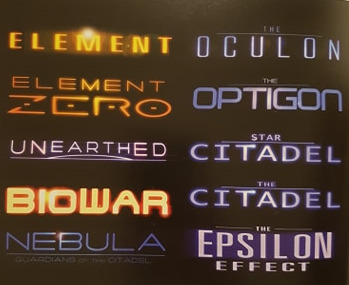
[In case you can’t read it the subtitle in the bottom left logo above is “Guardians of the Citadel”]
Note: Drug use is mentioned.
Cut for length.
Mass Effect 1
ME began its life in a vision document in fall 2003
Codenamed “SFX”
Conceived of by Casey Hudson and a core team from KotOR. Its genesis was the intention to create an epic sci-fi RPG in an original setting that BioWare owned (so they could have full creative control), and in a setting that was conceived of first and foremost as a video game
Initially players could control any squadmate, but they wanted it to be about Shep and for players to be focused on Shep being a battlefield commander, rather than on switching bodies
By the start of 2004 its story was shaping up. Initially humans landed on Mars in 2250 and discovered evidence of an ancient alien race and a powerful substance, Black Sand, which rapidly advanced tech to the point that FTL travel was possible. (My note: obviously now the Prothean artifacts on Mars & associated mass effect force tech enabled this in the final canon, but I wonder if aspects of the ‘Black Sand’ naming-type & powerful substance stuff was rolled into red sand from final canon) Humans were suddenly capable of travel to multiple star systems and made contact with a multitude of other species. At the start of the first game, these species together with humans had a fragile peace, with focus placed on the political center of the galaxy, a hub known as Star City, later renamed the Citadel
Multiplayer was a vision for the series as far back as 2003. The plan was for ME1, an Xbox exclusive at launch, to take advantage of the platform’s online components. Early designs saw players meeting in one of the central hubs to interact and trade items in their otherwise SP adventures
By 2006 it had the name ME and the story was more specific, with the theme of conflict between organic and synthetic lifeforms. The story’s scope now stretched across 3 games and included scope for full co-op MP
They tried to do MP in every game, discussing it from the get-go, but it always just fell by the wayside. “When you’re trying to build something that is a new IP, on a new platform, with a new engine, you’ve got to really focus on the core elements of the game.”
The conversation system prototype was made in Jade Empire, and some of ME’s earliest writing was done in an old JE build. At first there was no conversation wheel. Paragon was “Friendly” and Renegade “Hostile”. In the prototype Shep was a silent unnamed Spectre. Many conversations in the prototype about the player’s choice in smuggling a weapon through Noveria made it into the game
In said prototype a merchant referred to themselves as “this one”, though the word hanar never appeared. The PC in it also had the option to end a conversation with “I should go”. In the prototype also, Harkin was voiced by Mark Meer
An early version of the Mako got used as the krogan truck in ME2
Early concepts of the Citadel were drawn in pencil by CH. A piece of concept art of its final design was painted based on a photo of a sculpture near Aswan, Egypt
As with any new IP naming it was a struggle. They put out a call to all staff for ideas, did polls, made a name generator that combined words that they liked in random ways and made pretend logos of ones they liked in Photoshop to see if they could make themselves love the name or find visual potential in it. (Some of these names are in the pic at the top of this post.) CH liked “Unearthed” as it was a reference to Prothean ruins dug up on Mars and humanity’s ascendance going away from Earth. They knew the game would have a central space station featuring prominently so some of the ideas were based on that - “The Citadel”, “The Optigon”, “The Oculon”. “Element” was another one they had in mind due to the rare substance in the game
CH: “I was a big fan of John Harris’ book Mass, which had epic-scaled sci-fi ideas, so that was a word that came up often. Many of the names came from the idea that the IP featured a fifth fundamental physical force (in addition to the known four of gravitational, electromagnetic, strong nuclear and weak nuclear) so the word ‘effect’ came up pretty often.” Ultimately none of the ideas really felt right. One Monday morning they were going over the names and Greg Zeschuk said he had an idea on the weekend: “Mass Effect!” CH: “I said, ‘I don’t hate it’, which in the naming process is a high compliment. And it stuck!”
CH on Shep’s Prothean vision from the beacon: “It was hard to imagine how we would do this. CG was - and is - really expensive. Instead I wanted to try doing it through photography and video editing. So I went to a local grocery store and bought a few packages of the weirdest looking meat that I could find. Then I set up a little photoshoot in my basement, complete with some electronics parts and some red wine for juicyness.” He used these props to create a video sequence where the photos were rapidly cycled and blurred, along with production paintings, to create the scary vision an organic/machine experiment on the Protheans. These mashups were also used as inspiration for concept artists and level designers who were working on these themes
Tali used to be called Talsi
On the licensing side they often joke that they’re licensing N7 not “Mass Effect” due to N7′s popularity
There was a confidential internal guide to the IP in 2007 to help devs along and summarize/synthesize the vision etc. Some excerpts from it are shown in the book and this is the first time the public have ever seen them
Early versions of Asari had hair
Asari were designed as a nod to classic TV sci-fi (with human actors wearing obvious makeup and prosthetics to play aliens)
The turian design guideline was “we want them to be birds of prey”. They also wanted a range of alien types, some close to human like Asari, while others were to be a lot further away, like turians
BioWare patented the conversation wheel, which was a first for them. CH had been frustrated with reviews of Jade Empire that said that the actioncentric game was too wordy [with its list dialogue]. “I’m like, story is words. [...] What is it about our games that is making people feel like they’re wordy?” Then he thought “In a game you kind of need to feel like you’re continuing to play it. Maybe you should continue feeling like you’re playing it actively into the dialogue.” “[The wheel] kind of gave a new experience with dialogue when you did start to react based on emotion, and that’s ultimately what we’re trying to bring out in our games”
The original krogan concept was based on a bat “with a really wide squidgy face. We just used its face on top of this weird body and it kinda worked”
Geth musculature was based on fiber-optic cables, with flexible plates of armor attached
The vision for the IP was 80s sci-fi inspired space opera
The concept art of Saren lifting Shep by the throat inspired a similar scene in-game. The staging wasn’t planned til designers saw that art
A squadmate with Shepard on the way to meet Ash in an old storyboard was called Carter. Early name of Kaidan or Jenkins?
Bono from U2 was kinda instrumental in bringing us ME lol
Finding the right cover art for ME1 was notably tricky
Matt Rhodes got his start drawing helmets for ME1, including one which would become Shep’s “second face”. He estimates he drew between 250-270 different ones
Some of the sounds in-game were people smashing watermelons with sledgehammers and sticking fists into various goos
The audio team had fun trying to slip the iconic main theme into unexpected places throughout the MET. “We were very aware of how powerful that track was for the fans and it was tempting to overuse it for any moment we wanted to make really emotional”.
The theme was creatively repurposed in ME3: slowed down and reworked as the ambient sound for the SR-2. “If you listen to it for a really long time, just stand in the Normandy and listen, you’ll actually hear the notes change slowly. It doesn’t sound like music, it sounds like a background ambiance, but it’s there.” (My note: Well no wonder the Normandy feels so much like home?? 😭 sneaky..)
Bug report: “Mako Tornado”. There wasn’t enough friction between the tires and the ground, causing testers to lose control of the vehicle and send it spinning into the air like a tornado. “As it turns, the front end comes up, and then it starts spinning and spinning and spinning and spinning faster and faster and faster until it just flies up in the sky” (My note: Sounds like a regular day in the Mako to me)
Cerberus originally had a bigger role in this game. It was cut but they had a whole explorable outpost. “I called it Misery,” says Mac Walters, “It was this planet with a little outpost that said ‘Welcome to Misery’”. Everything on the outpost was shit - dirty worn stuff, no windows, no kitchen, the vehicle bay was open to the elements etc
The Reaper sound is literal garbage. Some audio designers went on a recording trip to a national park. One of them got fixated on a garbage can, “a metal bear-proof receptacle with a heavy lid that creaked horribly when opened”. “It was like, ominous, spooky, tonal and almost musical. I decided to throw a mic into the garbage and record it moving. I didn’t know what it was going to be until later”
They were making lots of noises to record like throwing logs and rocks around. An old couple peered at them through the window of their camper van in the woods and must have called the cops because then the cops showed up, pulled them over and told them to stop. The cops towed their car (the driver’s plates were Cali plates and expired), drove them to Edmonton outskirts and then the audio producer Shauna got a call and had to go pick them up “like three little boys”. “We got a stern talking to”. Once back they were playing around with the garbage sound, editing it etc. Casey heard it and proclaimed “That’s the sound of the Reapers”
Preston Watamaniuk: “There are things I could have done to Mass 1 to make it an infinitely better game with better UIs” and some simple cuts and changes. “But when you’re living with it, it’s very hard to see those things”
BioWare Labs
As social media and smartphone games exploded, BioWare dedicated a small team dedicated to exploring opportunities here - BioWare Labs
Mass Effect: Galaxy used a unique graphic art style and static visual presentation common in visual novels. It has the distinction of being the only iOS game BW have made during their first 25 years
Scrapped ideas were a 3rd person space shooter called Mass Effect: Corsair and 2 DA titles - a strategy game and a top-down dungeon crawler starring young Wynne. (My note: Maybe the corsairs stuff was rolled into Jacob’s backstory in 2, the Alliance Corsairs)
Corsair was a very short-lived project that never got its feet under it. It was a spin-off on Nintendo DS featuring a behind-the-ship perspective and branching dialogue. At one point it had MP. The idea behind it was basically “ME: Freelancer” - fly your ship around, do missions, get credits. It had a limited branching story but was a gameplay-centered experience intended to fill the gap between ME1 and 2. That gap ended up being filled by Galaxy
Galaxy and Corsair’s smaller screen allowed concept artists to use bold colors and a simplistic character design style to help those games stand out from Shep’s story
Nick Thornborrow did some art for Corsair but was worried his art style didn’t fit ME. He moved to DA where he feels his art style fits better
Lots of BioWare VAs and even a lead writer and the VO director are drawn from Edmonton’s local community theater scene, which is vibrant. Think this is how Mark Meer got involved
Mass Effect 2
Player choices carrying over was a first for BW
Dirty Dozen-inspired plot
Its plot is a web of conditionals (see Suicide Mission)
Was more of a shooter than anything BW had made since Shattered Steel
There was 2 camps on the team, those who wanted to push combat and systems forward and redefine the ME experience and those who wanted to make a true sequel, with the same gameplay and systems but a new story. Karin Weekes: “I think it ended up being a good push-pull. It felt like a pretty healthy creative conflict”
“ME2 was a game you could hold up to someone who argues that games aren’t a serious medium and go ‘Oh yeah, then why is Martin Sheen in this?’” Sheen was their first pick for TIM
The idea for TIM came from a mash-up of concepts CH had collected over the years. The name “Illusive” originally came from his pitch for naming DAO’s Eclipse engine, a word inspired by Obi-Wan’s line “It’s not about the mission, Master. It’s something... elsewhere. Elusive”. “I thought, what if we called our next engine 'Elusive', but used an ‘I’, and then it’s like ‘Illusion’. [...] I still really like the word with an ‘I’ and what it conjures”
When ME1 DLC was in production, CH had been watching a lot of CNN, specifically Anderson Cooper. “How is one guy travelling to all these places and never looking tired and always being able to speak with clarity?” CH says it seemed almost superhuman. “What if there was someone who is the absolute maximum of the things you would aspire to be, but also the worst of humanity?” Cooper, though not evil, became an inspiration for TIM down to the gray hair and piercing blue eyes
Inspiration for TIM’s behind-the-scenes role pulling political strings came from Jack Bauer’s brother Graem in 24. Graem “can call up the president and tell him what to do and hang up, because he’s so connected and so influential”. Sheen had played a president and his performance brought gravitas and wisdom to the role. He had quit smoking, but the character smokes. He didn’t want to fake it, but he also didn’t want to smoke, “so he actually asked for a cigarette” to hold so he could stop his words to take drags with natural cadence
Writing was still pushing to write and revise lines hours before VO started. A series of problems like injury and some writers leaving for other opportunities left it so that Karin, Lukas Kristjanson and editor Cookie Everman hand to land the story safely, with PW helping where they could. Lukas: “We took over the writing bug and task list, and I can’t stress enough how much [Karin and Cookie] did to get ME2 out the door. There’s no part of that thing we didn’t touch”. Karin: “That was the most dramatic 2 weeks of my life”
Initial fan reaction when they started promo-ing ME2 was very negative because people didn’t want to know about new chars like Jack and Mordin. “[fans were like] ‘Get them out of here. We want our characters from the first game’. But then when they played them, those became some of the most popular chars [of the series]”
Concept art of Thane has an idea annotation saying “Face can shapeshift?”
At one point when designing Thane concept artists sent multiple variations of him to the team asking them to vote on which was the most attractive
Most of the Normandy crew was written by lead level designer Dusty Everman. Lukas gave him advice in the evenings between bugs
BioWare Montreal made ME2 and 3 cinematics
CC for Shep was based on tools used by char designers to create in-game chars. Under the hood similar tools existed to create aliens
Aliens were much easier to animate than humans. When something is human it’s very difficult to make it look realistic and you can see all the mistakes and everything
Over the holiday period in 2007 CH worked out a diagram on a single piece of paper that would define the entire scope and structure of the game. The diagram is included in the book
Bug report: “I shot a krogan so hard that his textures fell off”. At one point shotgun blast damage was applied to each of the pellets fired, and shot enemies ended up with just the default checkerboard Unreal texture on them after their textures got blown off
Blasto was meant to be 1 step above an Easter egg but his fan popularity prompted them to bring him back in ME3
They rewrote chunks of Jack 2 days before she went to VO. She was the only one they could change because all the other NPCs were recorded. They redesigned her mission by juggling locked NPC lines and changing Shep’s reactions by rewriting text paraphrases to change the context of the already-recorded VO
Lukas snuck obscure nods ito ME2′s distress calls. In the general distress call for the Hugo Gernsback, there’s BW’s initial’s and Edmonton’s phone number backwards. In a fault in a beacon protocol there’s the initials and backward phone number from Tommy Tutone’s “Jenny”. In 2 other general distress calls there’s initials and numbers from Glenn Miller Orchestra’s “Pennsylvania 6-5000″ and initials and numbers from Geddy Lee and Rush’s “2112″ respectively
Mass Effect 3
“The end of an era marks the beginning of another”
ME3 “marked the end of Shep’s story”
Saying bye to Shep was as difficult for devs as it was for players
JHale’s final VO session included Anderson’s death and romanced Garrus’ goodbye. “We were in the session and we both just started crying”, Caroline says. “I couldn’t come on the line to give her notes because I was crying, and she was crying. And so there was just this minute-long pause of like, nothing, nothing, nothing - just silence through the airwaves. And then I came on and just told her that I was crying and she said ‘I’m crying!’” They talked about these anecdotes also here on the N7 Day reunion panel
The Microsoft Kinect voice support required devs to teach Kinect hundreds of commands in a variety of accents across multiple languages. The result was useful but made for some awkward moments. Numerous players accidentally said “geth” or “quarian” while making a particular decision and accidentally killed Tali
MP chars were voiced by cops and military people
The helmet on one of the MP chars was originally designed for cancelled project Revolver
The payload device at the end needed to attach to the Citadel while essentially serving as a giant trigger. “It ended up becoming quite the engineering feet just to visualize how this thing would move and connect to the Citadel”
Concept artists explored creating an anti-team, where Kai Leng was almost an anti-Shepard essentially, with an elite squad to counteract your team. This idea never went beyond concept phase
ME3 Special Edition was released on Nintendo Wii U exclusively. This exclusive version of the game includes Genesis 2 (a sequel to the original Genesis comic) and unique gameplay features that took advantage of the touchscreen GamePad. For years Sonic Chronicles: Dark Brotherhood had had the honor of being BW’s only game made for a Nintendo console
FemShep regrettably didn’t feature in major ME marketing til ME3. Later releases like DAI, MEA and Anthem have taken increasing care not to gender their protagonists in cover art
To capture combat sounds they took a trip to CFB Wainwright, a military base southeast of Edmonton. They got a big tour of it and were allowed to record anything they could find. The tour ended with them getting to drive and shoot tanks (real shells). The force of doing that sent waves through Joel Green, he felt his whole chest compress when it went off; the perfect sound for the Black Widow! After the trip the soldiers let him keep the shell he fired and it’s been passed on like a torch to various devs since
Kakliosaurs began life as a joke in the writers’ room after John Dombrow placed a Grunt figure on a t-rex toy he had on his desk. Lore was brainstormed to justify the mash-up before someone asked, “Why don’t we put this in the game?” They loved it so much Karin had custom coffee mugs made
Bug report: For a while Tali’s final romance scene would fire when she was supposed to be dead
“Balancing combat: how designers in ME3 entered an ‘arms race’” - the solution to players feeling OP vs players feeling frustrated by really strong enemies is to find a good middle ground, but for designers Corey Gaspur and Brenon Holmes, it was war. Brenon designed enemies, Corey designed guns. Corey “was obsessed with bigger, heavier guns. We had this sort of informal competition where he’d make this crazy overturned gun that would just murder all the enemies, and then I tuned some stuff up to compensate”
Brenon had to invent new ways to “stop Corey” and this led to the Phantoms. Corey had in turn designed consumable rockets that could wipe out entire waves of enemies. He must’ve figured this would make short work of Brenon’s space ninjas, but Brenon had other plans: “I had just added the ability for her to cut rockets [when Corey was playing MP and he was watching]. She cut the rocket in half... Corey just turns and looks at me and is like: ‘Really dude? I just shot a rocket at this Phantom and she’s fine? Not even damaged? Zero damage?’”
This friendly rivalry helped elevate ME3′s gameplay. Corey had a knack for making a gun feel so good to fire it had his fellow designers scrambling to keep up. It was his version of balancing. Before Corey sadly passed away he mentored Boldwin Li in all things weapon design and the arms race continued
Corey designed the Arc Pistol. It was causing problems for enemies because it was too powerful. It seemed hell bent on staying that way, Boldwin would tune down all its stats and it was still doing 3x the damage it should have been doing. “I was like ‘What the hell?’, and then I looked closer. It secretly fired 3 bullets for every pull of the trigger! Corey, you sneaky jerk”
The day it launched there were midnight launch parties across North America including one near the BW building. Numerous devs sat at long tables greeting fans and signing autographs as the fans picked up preorders. When midnight struck the line was long enough that it took several hours for some fans to get their game. One particular fan is remembered: “It was 3am. Some guy drove up from Calgary with his friends. He was like one of the last people in line. I think he was sort of tired-drunk. He threw himself across the tables, pulled up his shirt and shouted ‘Guys, sign my abs!’ And like I did, because he waited so long. It felt impolite not to. So I hope he enjoyed his copy of ME3″
For designing Protheans concept artists had free reign to design something that read as ancient
Before the concept art team had the story of the game to work toward, they explored wild ideas of their own including an image of the crew stealing back the Normandy to go after the Reapers
Jen Cheverie was testing scenes and was initially excited to be testing Mordin scenes, til she saw she was testing the Renegade version of his death. “This is even before like all of the audio and everything was in, so you didn’t even have the sad music. I remember sitting at my desk and my hands just went to my face when I saw that the gun Shep pulls on Mordin is the gun he gives Shep in ME2. I burst into tears and was crying for the rest of the day. People are waving to me as they walk by and I’m like, ‘It’s ok, I’m just killing my best friend’”
There’s a segment called “Shepard’s story ends”. Casey on the ending: “There’s a whole bunch of things that come together to make it incredibly tense and emotional for players. I think the biggest one was the sense of finality, that whatever it was that happened in that very last moment... was it.”
Wrapping up the story was a massive feat. In a way all of ME3 is an ending. Its final moments were the players’ last with a char they’d been with all the way from Eden Prime
“And while the critical reception of the game was extremely positive, many fans were unsatisfied with the ending, which became one of the most controversial in the history of games.” CH: “We were, on one hand, at the end of a marathon trying to finish the game and the series. But as devs we also knew that there would be more. We knew that we would continue to tell the story. In retrospect, we didn’t fully appreciate the tremendous sense of finality that it would have for people”. He envisioned an ending that posed new questions, something in the tradition of high sci-fi that left players dreaming about what that particular galaxy’s future could hold. “Frankly, there’s a lot more that we could have and should have done to honor the work players put in, to give them a stronger sense of reward and closure”
AAA games are massive undertakings with a million moving parts. Somehow they come together but even the best-planned projects don’t turn out quite like devs hope. From start to end video game production is a series of compromises. It’s rare if not impossible for devs to ship a game they’re entirely happy with. “I think that people imagine that when you finish a game, it’s exactly the way you wanted it to be. But whether people end up loving or hating the final result, we work hard to finish it the best we can, knowing that there’s a lot we would have wanted to do better. I think that’s true of any creative work”
As the dust settled after the initial reaction to the ending and later its epilogue, meant to show the wide-reaching ripple effects of Shep’s final choice, “players emerged mostly asking for one thing”. CH: “Now, most of what we hear, after both ME3 and MEA, is ‘Hey, just go make more Mass Effect’. And that to me is the most important thing. Knowing that players want to return to the ME universe is what inspires us to press on and imagine what comes next”
Mass Effect: Andromeda
By creating a new ME in a new galaxy the team was challenged to put their own visual stamp on the game while keeping it true to the franchise
Being the first ME game on a new gen of consoles meant for more detail
“Massive transport ships called arks populated with salarians, turians, humans, asari and quarians” made the risky jump to the Cluster
MEA was the first time BW had truly codeveloped across 3 studios: Edmonton, Montreal and Austin. The bulk of the work especially early on was done in Montreal, which was composed of a handful of Edmonton expats and heaps of experienced devs who joined from elsewhere specifically to bring a new ME experience to life. Series vets in Edmonton then came on to contribute writing, cinematics, design and QA, along with leadership from creative director Mac Walters and the core Production team. Austin writers and level designers also joined the fray
“It took a new team to take ME beyond the Milky Way”
Mac: “A lot of people in Montreal joined BW as fans of the franchise, so they just had this passion, and it felt like it was more like the days of Jade Empire, where a smaller younger team gets to do something for the first time. Even though it wasn’t necessarily a new IP for me, it felt fresh and new because of that. The team was just super excited to be working on it”
Early plans had the player exploring hundreds of worlds, procedurally generated, allowing for a nearly infinite variety of experiences. But as development wore on, it became clear that the game narrative required more specific, hand-touched level design on each world to keep the story focused and the experience engaging. “The plan was to give players numerous uncharted worlds to explore. Designers worked hard to come up with procedural elements that would make such planets special. Eventually the team made the difficult decision to abandon procedural planets in favor of more memorable hand-touched alien worlds, each with a specific story to tell”
One challenge was defining what ME meant without Shep. Care was given to include many of the MET’s key species. “Ryder recruited turian, asari, krogan and salarian followers”. Like Shep Ryder represents humanity’s hope for a peaceful coexistence among aliens who had long operated without human contact
Beginning with MEA the team decided that with few exceptions vehicles in ME have 6 wheels. Early Nomad concepts were bulkier. Later ones focused on its ability to move over its ability to protect itself from hostile fire, underlining the themes of exploration
German concept designer and auto-motive futurist Daniel Simon was contracted to create the Nomad and Tempest. The Tempest’s final design took inspo from the Concorde
Concepts for angaran fighter ships have the following notes: “Two doors swing open, wings rotate down to function as landing struts, the landing struts split open. It has a spinning turbine engine
Despite being set a galaxy away and some 600 years after Mordin’s death, there was a time when he had a cameo. It wasn’t cut due to running out of time however, it was cut due to drug references. John Dombrow explains: “One day I had to write a small quest for Kadara. I thought it’d be amusing if these 2 guys living way out on the fringes in a shack were growing plants for uh, medicinal purposes, and needed Ryder’s help with it. It occurred to me, wouldn’t it be amusing if Ryder had the option of actually trying ‘the medicine’ to see what would happen? And I thought, what if it turned into some hallucination that somehow involved SAM - like maybe SAM would sing? But why? How could I motivate that? Then it hit me. Who else in the ME game sings unexpectedly? MORDIN. As a nod to him I wrote SAM singing Modern Major-General. It got even better when our cine designer John Ebenger wanted to take it even further. Bless him, he came in on a Saturday to do a special hallucination showing Mordin himself. It was great. Til the fateful day we were told MEA had already been submitted to the ratings board. That’s when you declare things like drug references in your game. Mordin fell under that category which meant it was a no-go. We were too late”
Ryder’s white AI armor contrasts Shep’s iconic dark armor (intentional design)
Concept art for Ryder involved experiments with cloth (cloaks, ponchos, capes - “Pull here to release cloak”) and asymmetrical design elements
For alien design, there’s a few exceptions but humanoid figures are the ME standard and this persisted into MEA
Kett and angara concepts explored striking lines and textures
– From Bioware: Stories and Secrets from 25 Years of Game Development
#mass effect#mass effect: andromeda#bioware#video games#jade empire#Bioware: Stories and Secrets from 25 Years of Game Development#Bioware: Stories and Secrets from 25 Years of Game Development spoilers#Bioware: Stories and Secrets from 25 Years of Game Development spoiler#spoilers#spoiler#lul#dragon age#garrus vakarian#best boy#feels#anthem#long post#longpost#drugs for ts#drugs mention#drugs cw
416 notes
·
View notes
Text
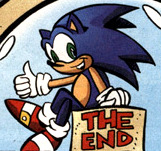
And so that’s it... nearly 200 issues deep, we’re done with the contributions of original writer Michael Gallagher. I’ve been asked in the past about the possibility of writing an article going over Gallagher’s run, like what I did with Penders. And I might still do that. But for now, here’s a shorter postmortem summarizing my feelings on the work of the original writer for history’s longest-running video game comic
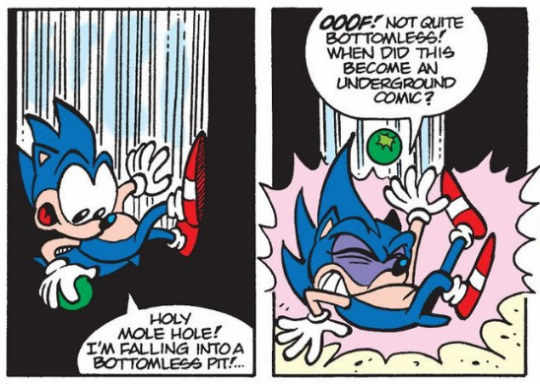
I think it’s easy to look back on Gallagher’s silly old stories with a lot of nostalgia, especially after seeing what the series would become in its Dark Age. I can’t blame anyone who feels this way. I feel that way sometimes, too. It was a simpler time, with short, self-contained stories and a ton of puns, and it was a lot more easily digestible than a lot of the teen melodrama and half-baked sci-fi that followed. But the thing is... that doesn’t mean that Gallagher’s writing was good
Gallagher was always an odd fit for Sonic. I can’t really blame the man for introducing lame concepts like Cal and Al that didn’t fit in with Sonic early on because it’s not like he had much to work with in the early days. The guy was expected to write a monthly comic series based on a couple 16-bit platformers with very little story and some snippets from a cartoon that wasn’t out yet. He also had no way of knowing that his work here would lay the foundation for the longest video game comic ever made. I don’t envy his job. Of course he’d do a goofball story where Sonic travels back to caveman times. It’s not like he had much else to do
But as the series progressed and the cartoons and games gave the comic writers more material to work with, Gallagher didn’t really play along. He gave us a few solid, fun stories like Mecha Madness, but for the most part he was off in his own world, trying to sell us on shoehorned characters like the Forty Fathom Freedom Fighters or the Downunda Freedom Fighters who existed almost exclusively to deliver new flavors of lame pun. One time he even worked with Jim Valentino to make a naval-gazing parody of classic Guardians of the Galaxy so they could make lame puns about a comic they used to write (that very few children in 2001 reading Archie Sonic would be familiar with)
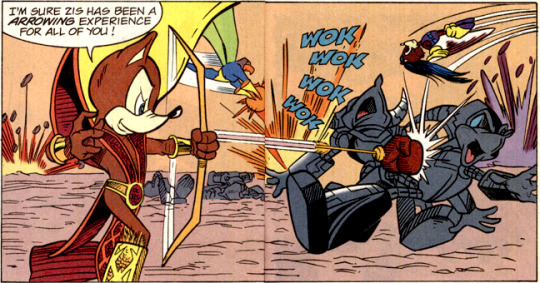
People generally pinpoint Penders as the guy who became obsessed with his own pet characters over the main cast as time went on, but really, Gallagher was just as guilty. And honestly, sometimes Gallagher doing it bugged me more. At least Penders had some prominent characters people actually liked, like Elias, Lara-Su, and Julie-Su, as well as some semblance of an overarching plot to work with. Meanwhile Gallagher was over here trying desperately to get people to care about a group of characters he had created exclusively as a vehicle for trite Australia jokes
Gallagher did introduce a few characters who stuck around, but he doesn’t really deserve much of the credit for that. Most notable would probably be Fiona Fox, who would become a major recurring character under later writers... except Gallagher only really invented her robotic doppelganger that Robotnik tricked Tails into falling in love with that one time. He created Knuckles’ grandfather Athair, the one comic character to somehow make it into a cartoon, but Penders helped out with that lore and did more with the character, meaning most people just assume he’s another Penders echidna. He created Tails’ parents, but Karl and Ian were the ones who actually did stuff with them. And he created the Ancient Walkers, who were kind of neat at first but quickly devolved into a tired plot device, only to be killed off by Ian almost immediately to cut down on the deus ex machinas. If you look at the list of characters Gallagher created, it’s mostly just randos he created for the sake of puns
And that’s really what most of it comes down to. Lame puns. I’m totally down for Sonic stories that go for a silly tone. I love Sonic Boom as much as the next fan, and I’ve been having a blast with the extremely goofy Sonic X comics. I’m not a cartoon snob who won’t watch a show that doesn’t have action and drama and lore, I’m out here watching shows like Apple & Onion. But while Gallagher could write good jokes sometimes, he mostly relied on groanworthy newspaper strip-level puns. (I guess it’s fitting, considering he’s related to both the guy who created Heathcliff AND his successor who makes those comics about the Garbage Ape.) I love me a good pun from time to time, and a lot of Gallagher’s are funnier when shared out of context, but when a story is just wall to wall puns it becomes agonizing. Puns should be a spice, not a main ingredient. And when Gallagher got a chance to follow an ACTUAL newspaper comic strip format in the Off Panel, he fared even worse. It was so rare for the Off Panels he wrote to actually be any funny
He WAS genuinely funny at times, though. I’ll give him credit for that. I don’t want it to seem like I hated ALL of his stories. (He did impress me with at least one political joke that’s sadly still relevant today, and in hindsight there’s something really funny on a meta level about the dark and gritty return of Cal and Al.) I think his best work came when he was paired with better artists. Scott Shaw’s more energetic Sonics really helped sell the cartoony comedy in the original miniseries, and obviously Spaziante’s work on Mecha Madness made that story legendary. When he was stuck with the less exciting Manak or Mawhinney, though, not so much
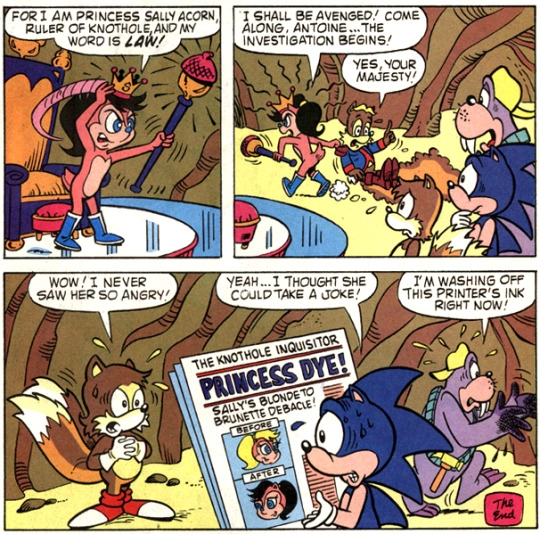
Beyond the puns, there was also this undercurrent of nastiness, meanness, and general grossness in his stories that I don’t see as many fans pick up on. This was mainly evident in the many odd decisions he made with the female cast
We had his take on Sally, who was treated as little more than Sonic’s annoying, moody, bossy girlfriend who bickered with him, sat on a big throne, and occasionally got to be a damsel in distress. He added Bunnie to the cast early on, but it felt like he didn’t have many ideas for what to do with her except make her the butt of jokes about her being a southern belle, including literally making her say “the South shall rise again!” We had Barby Koala’s extremely creepy flirting with Tails, who was half her age. We had that tone deaf Off-Panel joke about turning the special dedicated to the female readers into a swimsuit special (which isn’t far off from what everyone else actually did). And we also had that baffling story where Dulcy killed her mother. I have NO idea what the fuck he thought he was going for with that one.
It wasn’t just the girls, though--Antoine was somehow even more of a punching bag in Gallagher’s early stories than he was on SatAM. At least in the cartoon Sonic was responding to Antoine’s’ massive ego when he poked fun at him. In the early comics, Sonic would constantly rag on Antoine at any opportunity he got. It was VERY distracting in the early issues, and it made his Sonic come off as way more of a jerk
Later writers would often talk about needing to fix certain characters. Penders, for all his countless insufferable faults, used his early stories to steer Sally towards the version of the character fans knew from SatAM. (He then ruined Sally in his own special way, but, you know.) Just about every writer who touched him spent years and years trying to fix Antoine and make readers stop hating him. The unspoken part here is that the original incarnations of these characters that everyone had to work so hard to fix... were Gallagher’s
Again, Gallagher didn’t have an easy job as the first writer on this series, and most of his stories were... fine. Nothing I’d recommend to non-fans, but they had their moments. They make for an amusing read for their sheer absurdity. But a lot of it ranged from not very good to outright bad. We’ll always cut him some slack for having so little to work off of when he started and for writing stories that were, in hindsight, better (or at least less grating) than a lot of the melodramatic schlock that came later. I’ll always have some nostalgia for those simpler times. But that doesn’t necessarily mean that Gallagher’s stuff was ever all that good
But I can’t hate the guy too much, because he gave me the greatest Sonic character of all time
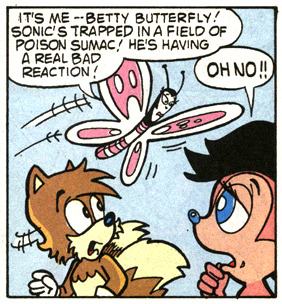
219 notes
·
View notes
Photo

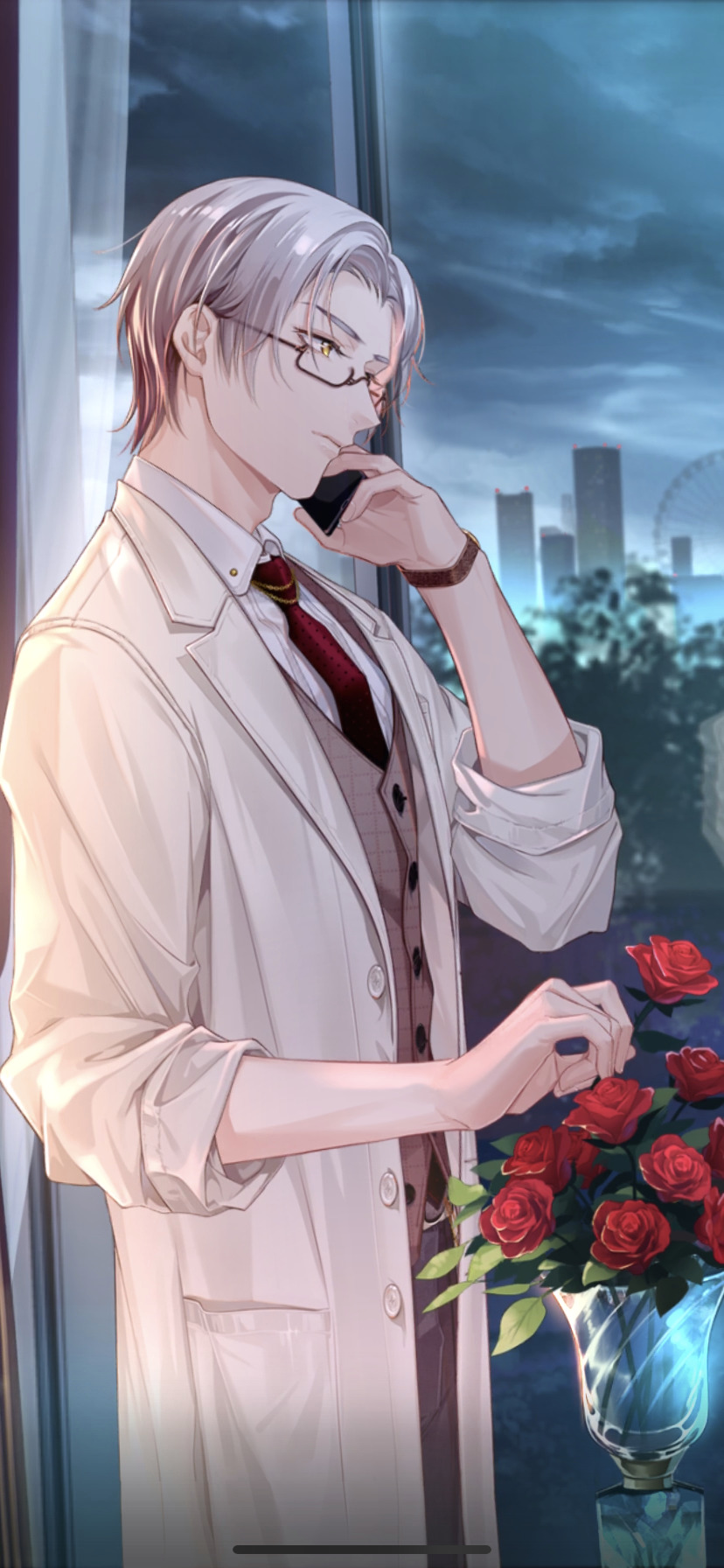
Xu Mo vs. Mo Yi [Character Study]
I can never get over the aesthetic of these two pictures placed side by side LOL. But, anyway, the point of this post is to nip any undue comparisons in the bud and claims of copying organize my thoughts and compare these two characters to highlight their similarities, differences, and further explore each character through these contrasts.
Q) If you like Xu Mo, would you like Mo Yi?
Honestly, I think this depends on what you like most about Xu Mo. I already knew beforehand that I gravitate towards characters who think 5 steps ahead, are predominantly logical, and scholars/gentlemen, so it’s not surprising I bias both Xu Mo and Mo Yi.
However, as I got to know Mo Yi further (Themis is around 6 months old now), I find that he’s distinctively different from Xu Mo on three crucial points that’ll determine whether people from either camp will like the other character.
1) Stance on Others
In a post for Xu Mo, “Into Your World”, I argued that Xu Mo is an alienated genius who had troubles getting along with others, until he mastered the social game as an adult. However, you can still see glimpses of this as he tries to understand MC’s world and shares his own.
To be fair, Mo Yi’s past is still under wraps but I feel confident in saying that, while he was probably highly intelligent compared to his peers [SR Sculpted Heart], his isolation doesn’t seem to come from his innate nature but rather his social position (there’s heavy implications that he’s like some sort of noble or something) [SR Snowy Pine Fairytale].
IMO, these backgrounds really shaped the way these two men interact with the world.
Xu Mo has a detached and indifferent view towards other people. They simply exist and don’t bring anything positive or negative to him. His ambition to ensure the survival of humanity reflects this too because it’s pure utilitarianism; everyone (apart from MC) can be sacrificed equally for the greater good. If anything, he probably finds other people to be interesting subjects to study, no matter what kind of person they are. IIRC the only time he expressed dislike to people, or a group of people, was when he told Hades he enjoyed killing thieves LOL.
Meanwhile, Mo Yi has an elitist streak to the point where he and his MC actually clashed opinions and debated each other [SR Warm Fingertips]. It’s incredibly ironic because he’s a psychiatrist who treats his patients without judgment, but at the same time he looks down on so many things and people (PUAs, people who betray love, hypocrites who only seek power and fame) [Ch2; Personal Story Ch1-3; SSR Moonlit Ball].
One of the things I noticed early on is that Xu Mo draws from the Eastern scholar archetype, “Xu Mo Character Study”, while Mo Yi actually draws more from the Western gentleman archetype.
So, just to summarize this section, Xu Mo is detached from the world naturally and likes to observe people and try to blend in. Mo Yi deliberately draws a line between him and others and, at times, has the casual cruelty of someone born as nobility (arrogance is carved into his bones, even if he tends to keep it low-key because he generally has a “gentle and polite” attitude).
2) Stance on Love
Xu Mo didn’t understand love, or really even emotions. Love is grown between him and his MC (there’s multiple analogies throughout the game about how their love is like a seed). I think [Ch25] pretty much sums it up for Xu Mo, where he goes through that emotional rollercoaster and muses about how, at the end of human evolution, emotions should be discarded. He also admits that MC taught him the “fear” of a normal person, because now he has someone he cannot give up no matter what, which goes against his previous utilitarian beliefs.
Compared to this, Mo Yi fell in love at first sight. Yes, you read that right. The “scientist and logical” archetype fell in love at first sight LOL. Not only does he acknowledge it right off the bat, but he fully embraces it too and believes that real love makes people better versions of themselves [Personal Story]. Mo Yi is a through and through psychiatrist in that he never underestimates how primal emotions (and love) can be.
Heck, not only is this central to his personal story, but we also have hints that one of Mo Yi’s parents fell in love at first sight with the other person (and he inherited their predisposition for that). Unfortunately, their love had a tragic end and Mo Yi seems to have a huge grudge against his father for whatever happened to his mother (again, Mihoyo is keeping this a mystery LOL), but Mo Yi explicitly confirms that even if his love leads to a tragic end he will still walk down this road and attempt to change it [SR Cool Summer].
IMO one other difference between them re: love is this exchange that lives rent free in my head which I saw in a Xu Mo/Reader/Mo Yi fanfiction LOL. Bear with me here.
Mo Yi: Wearing a mask for a long time will tire you.
Xu Mo: It’s enough just to wear one in front of the necessary person.
Xu Mo and his MC make great efforts to understand each other’s worlds, but this understanding comes from the doors he chooses to open to her. He reveals himself as much as possible, but I think he’s an inherently private person (and there’s all that Ares stuff) so there are times where he hides things so that he doesn’t worry his MC. I think this is enough to count as a “mask”. Sometimes he pretends he’s okay when he’s not.
On the other hand, while I think Mo Yi shares the sentiment in not wanting his MC to worry unduly, he tries to reveal himself as much as possible. There’s an amazingly relatable conflict in him here where he wants her to know every side of him, but he’s also terrified of how she’ll react if he shows her his ugliest sides and imperfect sides (he has some sort of phobia or fear about imperfection, but Mihoyo has been keeping mum on the exact details of this so far) [Personal Story; SR Sculpted Heart].
It’s pretty ironic that Mo Yi wants to be perfect, but he realizes that the more perfect he is the more of a sense of distance there’ll be between him and his MC because of the subconscious pressure someone “perfect” brings LOL [SSR Border of Light and Darkness].
3) Stance on Growth
If you haven’t realized that one of Xu Mo’s greatest themes is the phrase “Take your time in growing”, then what have you been reading? Jkjk, but seriously this gets repeated in multiple places, although my brain always goes back to [Blossom Date] for this.
Even if he and his MC start off with fundamental differences (she believes all people have inherent worth and can’t be involuntarily sacrificed), he wants to personally watch the journey of her maturation. He also subtly guides and teaches her. Unfortunately, due to circumstances of the main story, he doesn’t get his wish and she grows up a lot out of his eyes, but their relationship still revolves around him wanting her to have as much time as possible to grow.
He’s, for a lack of better word, extremely gentle about this (setting aside as much of the Ares and story parts as we can, because LovePro’s story is tragedy on tragedy LOL). I think [Autumn Blaze Date] shows a good analogy for this, because he holds the bicycle steady for MC until she can get going on her own, and he also catches her the first time.
Meanwhile, Mo Yi... ha ha ha. I just came out of chapter 3 for his [Personal Story] and let’s just say his philosophy is tough love. It’s ironic because, in many of his other dates, he wrestles with an internal conflict to protect his MC but also to let her experience all sorts of things to both test and temper her.
This is going to touch on the previous topic about love for a moment, but a part of Mo Yi’s love at first sight experience is also “testing” the other person through all sorts of situations and, after seeing all their different sides, he can determine whether his love at first sight is one that’ll last for the rest of his life or if it’s just a fleeting moment of beauty and emotion.
He also extremely respects his MC’s sense of justice and pursuit of the truth in the world, no matter what she encounters, and I wouldn’t be surprised if this is what drew him to her in the first place. But MC’s occupation and beliefs will make her confront a lot of dark and dangerous things and so, whenever possible, Mo Yi lets her confront these in “controlled” situations to train her. If I had to make an analogy, IMO, he’d let his MC ride the bicycle and pick her up only after she falls, or when she’s like 0.1cm away from the ground LOL.
Mo Yi is (perhaps rightfully) called out on this by another character, who believes Mo Yi is too arrogant in believing everything is under his control and he can prevent MC from getting hurt whenever he lets her get into dangerous situations, and I’m interested to see if Mihoyo will let him experience failures with his philosophy so he can grow more, like the things Xu Mo went through re: his personal beliefs [Ch24].
Overall
I don’t know how well I explained myself, especially for people who don’t know anything about Mo Yi, and each section goes back and forth between the two characters LOL so here’s another section that attempts to describe their overall atmosphere.
If, like I said in my Headcanon Notes, Xu Mo makes me immediately think of all the words for soft, gentle, light, still, water, etc etc., then the words I constantly think about for Mo Yi is messily human. He’s like a bundle of contradictions, but coherent because it’s being intentionally done.
Mo Yi doesn’t discriminate against his patients, yet he can be elitist and looks down on others. He wants to let MC have dangerous experiences, but also wants to protect her. He wants to be perfect, but he also wants to reveal himself entirely to his MC because that’s real love.
In contrast, Xu Mo has a very clean and orderly personality LOL. You can draw clear cause and effect lines from his personality to his actions.
So, anyway, these are two interesting characters who start off with similar archetypes as scientific logical men of scholar/gentleman dispositions, but yet they’re also on opposite ends for a lot of things such as their approach to emotions and the world.
Oh wait, lastly, because I don’t have a good place to put this—but I think it’s funny—is that both characters are pretty possessive and greedy, but while Xu Mo does things in a sneaky, cunning and fox-like way Mo Yi gets ridiculously open about his jealousy and it’s hilariously cute but also almost childish? I often forget Mo Yi is older than Xu Mo by a year, because Xu Mo honestly feels a bit more mature than him LOL. If we count them actually aging by when their game came out though, then Mo Yi is 28 and Xu Mo is 29 now.
#mr love queen's choice#tears of themis#mlqc xu mo#mlqc lucien#wdsjb mo yi#love and producer#weiding shijian bu#mlqc#love and produc(ing) meta#tears of meta
125 notes
·
View notes
Text
The metanarrative’s grand narrative: Osomatsu-san’s characterization throughout the franchise
The growing cynicism throughout the entire Osomatsu-san franchise shows itself in season 3 with more prominence than anything prior. I think that’s pretty common amongst any “long-running” gag comedy - replacing a plot with spiteful commentary that’s admittedly pretty hit or miss at times. However, it invariably creates a negative but pretty funny character growth, and I love the way the show (I’m including the movie too as “canon” material considering season 3 has referenced it way too many times for me to disregard) has set up this metanarrative across seasons. Long post ahead.
Obviously, Osomatsu-san is self-aware and has a casual relationship with itself. No linear plot (though S3 seems to be trying it out and I’ve enjoyed it - I love that they’re willing to experiment), rather a collection of unrelated skits; and so it points out its own metanarrative because of this “lack of consequences.” With comedy comes impermancy and Ososan AND -kun will always bounce back from that week’s insanity. From the Oxford Dictionary, a metanarrative is “a narrative account that experiments with or explores the idea of storytelling, often by drawing attention to its own artificiality.” Basically: a story about stories.
On top of this, is what I’m calling the “grand narrative,” which is often used interchangeably with metanarrative, but here I’m making a distinction to make it less confusing. Of course, Ososan is a story about stories, but with that comes a story it’s not directly telling, which is where most of the (little) character development is taking place. This is what I’m going to call the grand narrative of a show whose premise is being a meta-aware comedy. I’ll admit I’m by no means an expert on these subjects, but storytelling methods are something I enjoy trying to analyze. As a media format, Ososan really utilizes the fact that it’s a tv show.
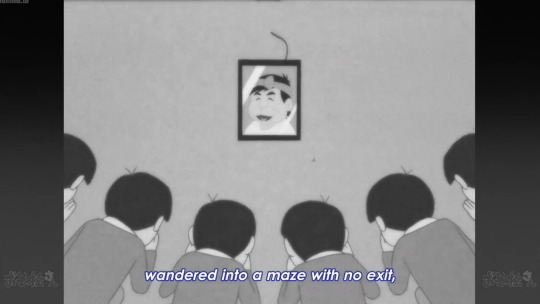
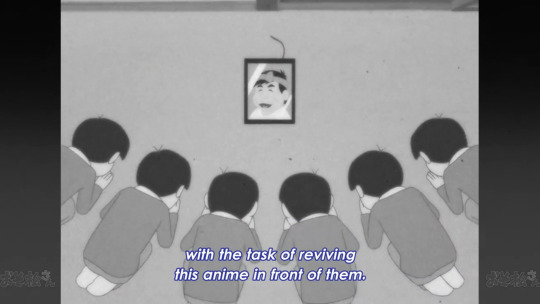
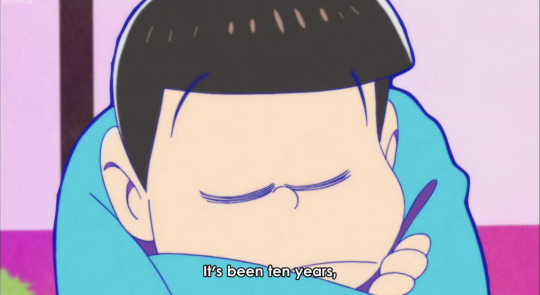
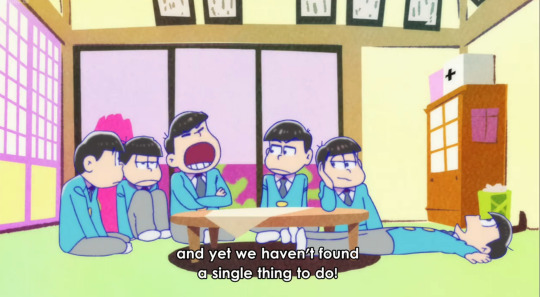
Right off the bat S1E1 makes it clear what to expect: Nothing. Not a damn thing. But, the show had already been cleared for this first season, so it has to be produced. This same episode’s preview is done by Osomatsu, which I’m just gonna quote instead screenshot because there’s too many.
“...we plan on properly starting the anime the next episode.” “...you ended up with an extra minute, so you need me to do something to fill it?! Actually, is this anime going to be okay with episode one being like this? I’m getting worried about how the rest of this is going to be...” “There, I used up a minute! [EPISODE ENDS]”
Episode one is not only batshit referential, but downright mocking the state of anime in 2015. Which, truthfully, I don’t have much to comment on in that regard, as I’m not an avid anime fan. However, it does this under the premise of being indecisive about what kind of anime they wanted the Osokun reboot to be.
They’ll do just about anything to stay popular and relevant considering that is, quite literally, all they have going for them as characters in the series and just being characters in general. They may be pieces of shit, but they’re likeable pieces of shit. The dynamics they’ve built upon to be entertaining is encouraged, and they’re basically just roleplaying different skits and fucking around.
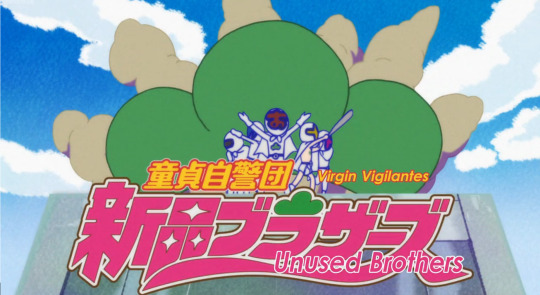
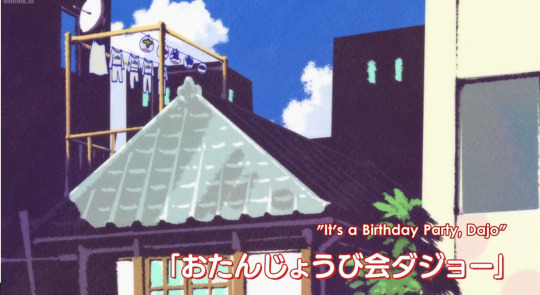
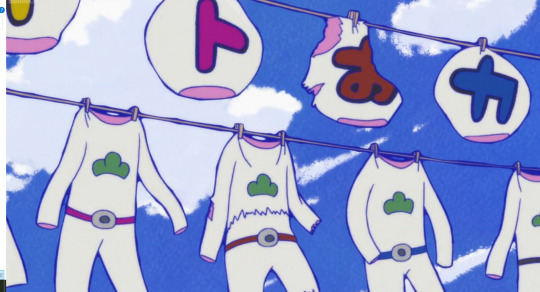
All the AUs! All the skits! They’re just playing! They’re just fuckin’ around!! They couldn’t come up with any interesting plot nor could they “graduate” from being anime protagonists and join the real world, so they just fuck around and make a gag anime!
Even if we follow both as the audience, the show makes a difference between the what’s them in their “normal life” (crazy begets crazy, no?) and what’s their “show.” But, really, that’s just one way to look at it, as they don’t really follow any rules as a show. I could say the Joshimatsus are separate characters from the sextuplets, and it’d be a “correct” interpretation. It doesn’t really matter - I’m choosing to examine it all as being the six of them just running around and playing, because being entertaining and having fun is all they know as characters. Besides, having it blended together beyond recognition reinforces how it prioritizes entertaining us, the audience, above logic. Storytelling doesn’t need to make absolute spatial-temporal sense for it to be enjoyable to fans.
In any case, that mentality really seems to be what pushes their character development negative, as they look to reinforce habits and rituals despite them being really detrimental for them in the long run. They know they’re popular characters as is, and with really everyone from staff to fans encouraging this behavior further, so they see no point in fixing what isn’t really broken.
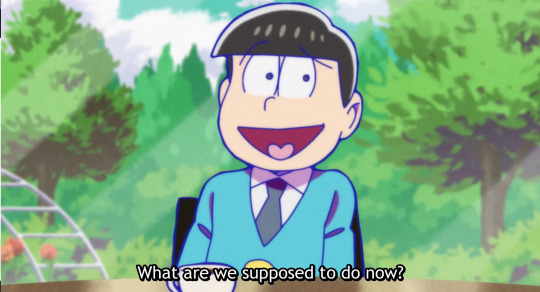

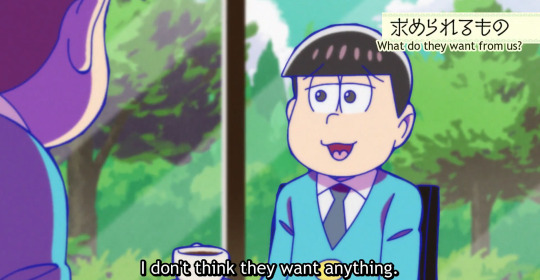
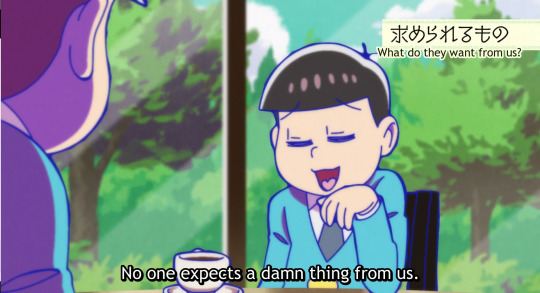
I found this 4 year old article from Manga.Tokyo discussing the Ososan phenomenon in Japan because while the craze died off pretty quickly in American anime circles (which deserves a whole other post), Japanese fans went fuckin’ nuts.
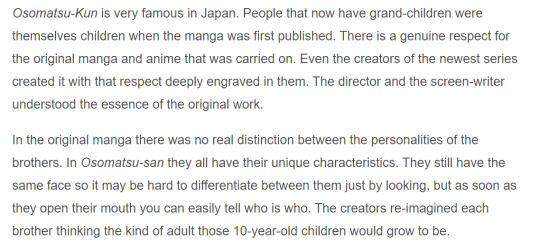
This portion caught my attention, as it makes sense that entitled and enabled asshole children would grow up to be entitled and enabled asshole adults. The article also goes on to compare them to idols (even beyond the F6 spoof) and that they are rooted in being comfort characters above all else.
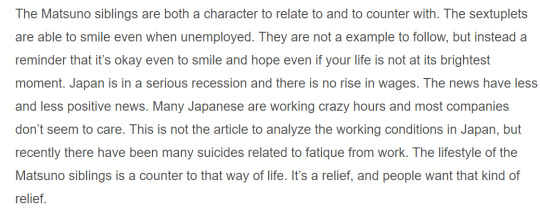
It’s worth a read, especially because Japanese fan response is what drives majority of the content post-S1, and, inevitably, ties into their character development.
They know that they’re Characters, particularly Protagonists. You know what happens to protagonists? Everything works out. Just about every single story created has stuff working out for protagonists. In fact, we have a whole genre made that separates stories with bad tragic endings from our Normal Stories. Ososan is a comedy, not a tragedy, so surely there’s gonna be some payoff somewhere along the road, especially as the seasons and other content are still being pumped out. To a self-aware, entitled, enabled protagonist, assuming everything is just gonna work out for you isn’t that far off from your narrative truth.
However, Ososan is a gag anime, and a lot of gag content (like 4koma mangas) is dropped for other projects before any emotional cathartic ending is provided for characters and fans alike. So, three seasons and a movie later, nothing has happened. It’s a great idol cash cow with a Family Guy filter, and the characters (and writers) don’t even bother to hide it anymore. And I know I’m being hypocritical concerning my definition of “canon material” but I think this portion from one of the drama cds “Choroplex” basically summarizes my point:
CHOROMATSU: Wait, don’t make this into a gag! You don’t even care about becoming employed, right? KARAMATSU: There’s no way that could happen... CHOROMATSU: What kind of future are you imagining? Is it nothing but this? [HUGE PAUSE BEFORE THEY MOVE ONTO SOMETHING ELSE]
They’re parodies of themselves and are running out of ideas. Stagnation and decay is normal, if not unavoidable, at this point in time for them. They’re just 20 somethings who’ve hit a wall but they’re too scared and insecure to bring about permanent positive change. It’s easier for them to fall back into normal patterns and joke off the rest.
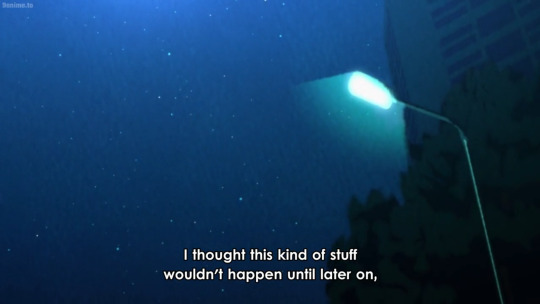
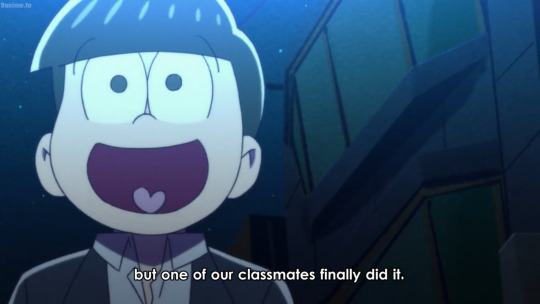
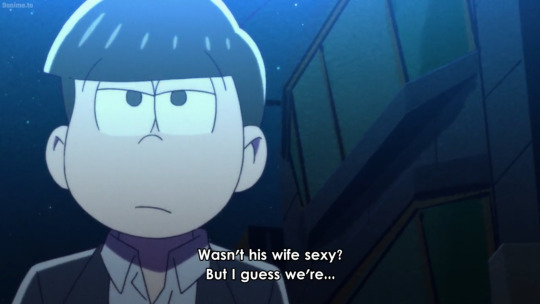
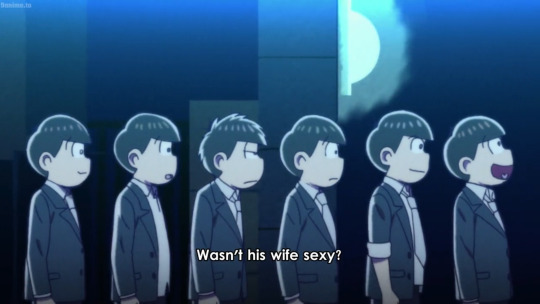
They have an antagonistic relationship with expectations. They can’t handle a single iota of expectations, or responsibilities. They’ve never needed to worry before, so why bother now? Once the biggest hits on the block, now they’re just guppies in the ocean, and there’s nothing they believe themselves to be able to accomplish to keep up with this big brave new world. This is epitomized in S3E15, where old man Osomatsu tells a bastardized version of the Tortoise and the Hare, blatantly projecting his feelings onto it. Again, too many screenshots so let me pull more quotes (bolding for my own reference):
“The place that the tortoise thought was the goal was not actually the goal. His journey down the road of life still continued on. The tortoise was quite tired, but he continued running anyway.” “No one actually knew who was in front anymore. There are too many people above you.” “After the tortoise found out how society worked, he thought, ‘So this is the difference in talent? No amount of hard work is going to fix this. All right. I’m done competing with others.’”
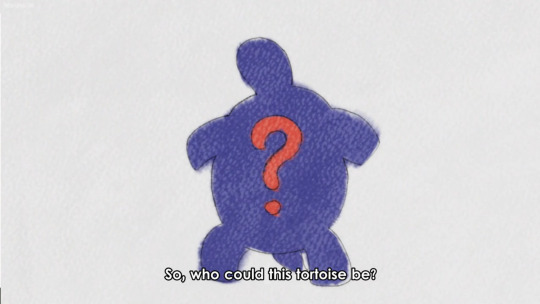
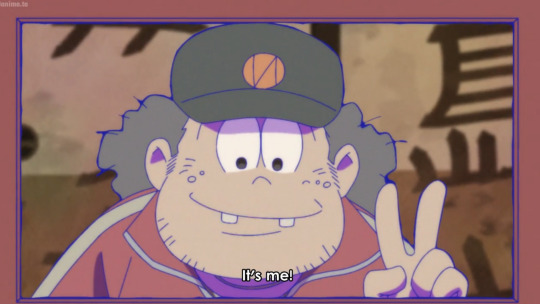
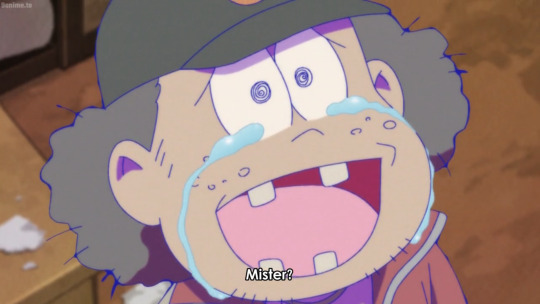
S3 has left more questionable endings than its counterparts. The last 2 skits I referenced don’t even a gag to them, and the marriage skit doesn’t play music for the entire second half of S3E5. There’s more involved too. I haven’t even brought up the rice ball twins becoming actual entertainers in their universe, or how they introduced this whole AI subplot only to reject it because All Six Of Them aren’t interested in expanding their little corner of the world. Here’s a transcript of the ending preview from S3E1:
“Hey, hey, Osomatsu here. I thought we were saved from being replaced, but I guess we get new characters next week. Man, we’re busy. New encounters, changing surroundings... We’re NEETs to begin with because all that is a pain. I guess a lot can happen after three seasons. [EPISODE ENDS]”
The sextuplets’ mindsets are extremely self-centered, which is also an environmental thing (the parents don’t even really care that they’re NEETs, for one) and an understanding of what they ought to be (epic successful protagonists). They also have a very black and white mentality, all or nothing. They’re extremely sheltered, and once they realized where they stood in society at large, they just gave up. To them the world is divided between winners and losers, and somehow, “inexplicably,” they found themselves to have fallen from grace. But they’re protagonists, that has to count for something! Everything’s gonna end up okay, right? Well... what this show has told them: No, not at all. They are consistently compared and warned of Iyami, and are perfectly aware of this fact, and have come to internalize it as a truth rather than a reversible self-fulfilling prophecy.
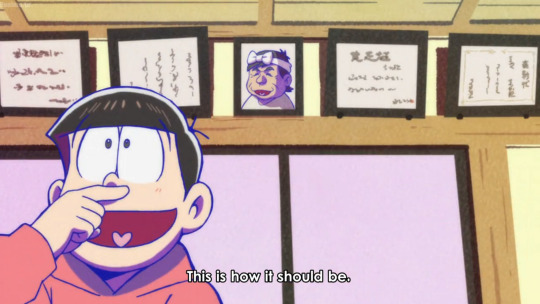
Too many screencaps, taken from the S3S5 marriage discussion:
JYUSHIMATSU: I wonder if we’re gonna get married someday, too. CHOROMATSU: Well, I mean... probably? I’m not exactly sure, but... TODOMATSU: What? You’re gonna get married, Choromatsu-niisan? CHOROMATSU: Huh? Well, yeah... someday.
Surprise! They have commitment issues! The same group that couldn’t commit to a fucking plot! Though their personality issues have several factors involved, I can’t overlook the theater motifs abound. Life’s a stage, and they’re performing entirely unscripted and it shows.
Do I think all of this is 100% intentional on the writers’ part? No, probably not. There’s also an extra layer here regarding contemporary Japanese commentary that I’m not familiar with, so I just ended up focusing on the characters. I can’t be in the writers’ heads, but whatever decisions are being made by executives regarding censorship and “compliance” are reflected in these character changes that result in being significantly more bitter and defeatist.
In the all or nothing, winner-take-all mentality, the only way to save face at this point, in their minds, is to own up to it - act like it’s what they wanted all along. And, hey, it’s funny to watch, right?
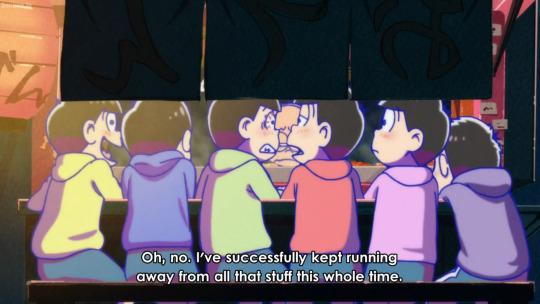
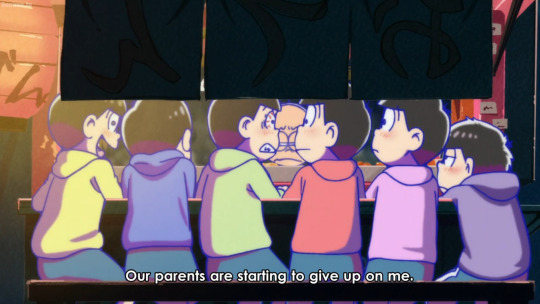
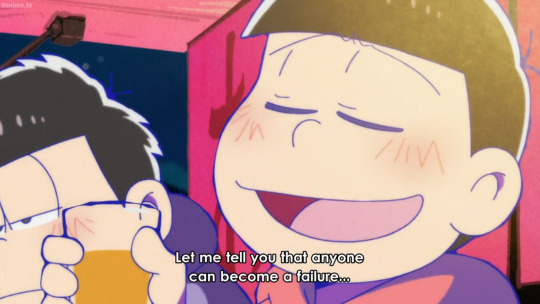
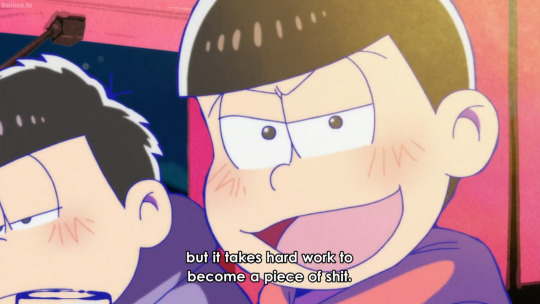
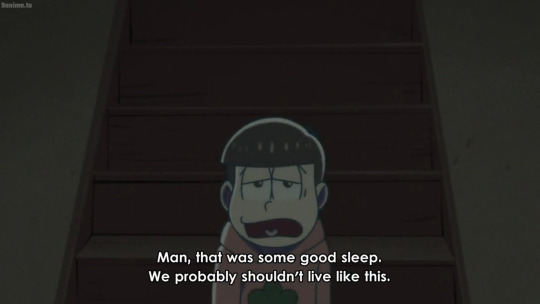
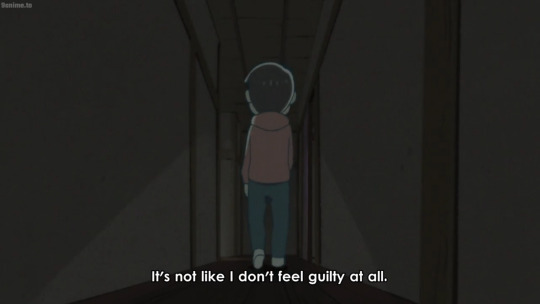
“Why is Osomatsu all my examples”, you might be asking. Well, he’s the damn blueprint for it all. The leader of the bunch, the first personality to grab your attention, has had all his issues projected and ricocheted in their echo chamber.
Ultimately, my point here is that you could think their “canon characterizations” (though canon means nothing in a show like this) as being intertwined with the nature of their self-aware existence. They’ve shown you all their tricks, the smoke and mirrors are getting boring, and they’re stalling long enough the story seems to be moving on without them - in spite of them. And when something genuinely threatens their way of life, they don’t know how to respond.
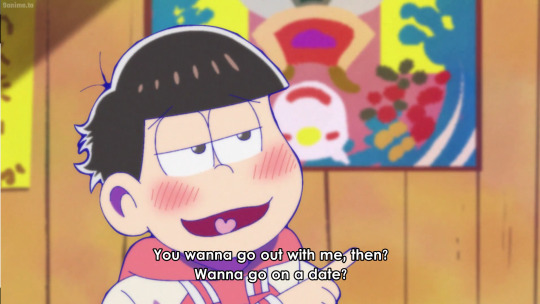
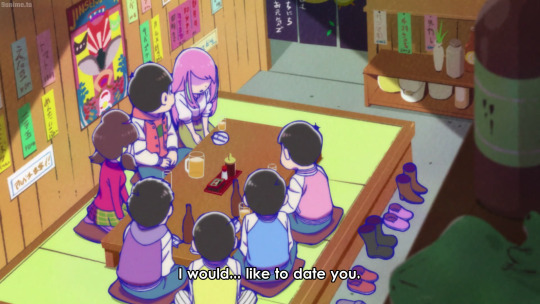
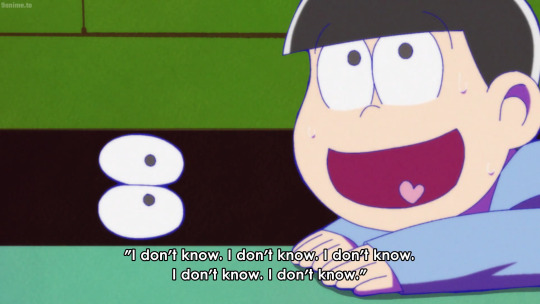
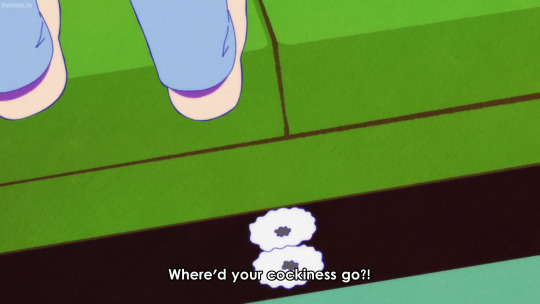
You can play it all straight, of course. Remove the meta jokes and all the same plot points can be hit, but, as a slapstick comedy, it’s able to easily add this additional layer in that I appreciate. I’ve said it in my last post and I’ll probably say it in more, but with comedy comes sincerity - the caveat of all the cartoon violence is that, on some level somewhere, this is how they really feel.
#osomatsu san#osomatsu#karamatsu#choromatsu#ichimatsu#jyushimatsu#todomatsu#osomatsu matsuno#karamatsu matsuno#choromatsu matsuno#ichimatsu matsuno#jyushimatsu matsuno#todomatsu matsuno#analysis#confession this was sparked by a convo i had w friends about s3e18#this is a bit truncated but i couldnt bring myself to make this longer#maybe ill make a pt2 or whatever idk
118 notes
·
View notes
Note
hello!!! im going on a very long trip at the end of april and I'm looking for some very long fics to download to keep me entertained! i dont care what they're about as long as there's no major character death or mentions of non-con. ur blog is a godsend ilysm and you do such a good job thank you so much 🙏
hi there!! i definitely have a lot of good lengthy fics i can recommend to you!
quote love unquote by newamsterdam
Sero nods. “It’s the chance of a lifetime, really,” he says. “We want you to date Bakugou, for the sake of his reputation with the press. Some public appearances, a few ‘candid’ photos. For at least a couple of months.”
“Bakugou sent you to ask me to date him?” Kirishima asks, baffled.
“Of course not. We, his people, are asking you to date him. He’s going to have to get on board, if he wants his career to survive. And in the bargain, Riot will get all sorts of publicity, because their lyricist will be dating one of the industry’s hottest stars. A win for everyone.”
When Kirishima Eijirou's band hits the big time, he's not prepared for his newfound fame. He's even less prepared to meet the actor he's been crushing on for years, or to start dating him as a publicity stunt. The closer Kirishima gets to Bakugou Katsuki, the more he realizes he's in over his head. But it's hard to stop, once his heart is in it.
acceptance and denial by poteto
It all goes okay when Kirishima decides to come out to his friends and it all goes wrong when decides that Bakugou is the best fake boyfriend material.
cause the darks not taking prisoners tonight by imatrisarahtops
“Are those soba noodles?” Kirishima asked.
Again Bakugou’s only reply was a grunt. He offered no further explanation—not that Kirishima honestly expected one—as though making soba noodles from scratch at half past four in the morning wasn’t at all a bizarre occurrence and made complete and total sense. For a fleeting moment, Kirishima even wondered if maybe he was the odd one here. Besides, he’d already decided it was generally not in his best interest to question these types of things with Bakugou, especially when it was something essentially harmless.
When Kirishima has a nightmare and is unable to fall back asleep, he accepts defeat and decides to study in the common area of the dorms. What he doesn't expect to find is Bakugou, also very much awake, and Kirishima can't help but think that maybe they're both having the same problems with sleeping. If he's worried, it's just because they're friends. (Right?)
the weight of your hand by kamin
That night, to the citizens, the explosions were a jolt of fear at every blast, but to the heroes and the students of UA, they were punches and swings, fierce fighting and loud strength. The explosions were the pulse of the battle, and the power of a boy that would never back down.
One after another, explosions set a chorus through the shuddering city.
And then, suddenly—the explosions stopped.
(In which Bakugou’s kidnapping goes a little differently, and just a few seconds could change so much.)
so take my hand (your life will be brighter) by multiclassmaps
When a stranger shows up at the ice rink during Bakugou's usually private training sessions, Bakugou expects to hate him. He doesn't expect to develop feelings that become increasingly difficult to deny, or for them to help each other sort through their emotional baggage. - Bakugou really didn't like Kirishima's smile. There was something about it that made his stomach hurt, something about it that made it difficult to focus. He definitely hadn't thought about that smile on his way to the ice rink that day. He definitely hadn't.
distance makes the heart grow fonder (false) by dragontrappedinhumanskin
When Bakugo and Kirishima get hit by a quirk that forces them to literally stick together or face the less then desirable consequences, how the fuck is Bakugo supposed to keep his crush hidden?! Well, turns out he never needed to.
-- “Well, this fucking sucks, how are we supposed to train?!” "Really closely?"
perihelion by tauontauoff
Bakugou was a comet, blazing out of reach. Kirishima knew he was stupidly lucky that his furious trajectory went by close enough that his fingertips got to graze the cowl of fire. It was enough.
During Christmas Class 1A and 1B spend a laid-back week learning about extreme environment hero work in the Alps. Kirishima was used to keeping part of his feelings for Bakugou hidden, and had every intention of keeping it that way, but things don't always go according to plan.
fight me by mr_todoroki
Bright red, spiky hair. Annoyingly bright smile. Clothes that radiate ‘look at me’ vibes. Neon yellow tank top with black shorts. And those were definitely crocs on his fucking feet.
Yeah, Katsuki hated this guy.
-
Bakugou gets a new roommate.
quietly by chezka
“We’ve been taking the same way to and from school for weeks,” Kirishima grinned, and then when Bakugou frowned at him he put on an affected pout, tilted his head so that he was looking at him through his thick, long lashes, “you never noticed? Am I that easy to miss?”
He could barely finish the sentence before a laugh escaped his lips, and Bakugou rolled his eyes, hit him with a shoulder a little more violently than necessary.
“You stick out like a sore thumb, broom-head,” he grumbled, promptly ignoring Kirishima's whining about his hairstyle when it started coming, “I didn’t notice ‘cause I didn’t care.”
“And now you do?”
everyone knows that cats are independent by purplepersnickety
Eijirou enjoys his job, working the graveyard shift at a 24/7 coffee shop. His daemon Riot is always there to keep him company, and he likes meeting the early-morning patrons and giving them the best possible kick-start to their day. It's been his routine for about a year now.
Then one day, a grouchy guy with a daemon in the form of a lion walks into the shop in the dead of night, and Eijirou decides to strike up a conversation with him.
punks not dead by wrunic
“So you want to use me to piss off your mom?” Kirishima summarized, raising one pierced eyebrow at Katsuki.
“Look, if you want to be all fucking judgy about it, I take cash,” Katsuki said, dropping his hand palm up on the table.
“Hey now,” Kirishima said, raising his hands in surrender, “I didn’t say I wasn’t doing it. I’m always down for a little chaos.” He flashed a grin, showing off his ridiculous shark teeth.
“Good,” Katsuki said. “We start tomorrow."
sent, delivered, read, loved by kiribakuhappiness
Kirishima E. [6.49pm]: ur okay for such an angry dude bakugou! :)
Bakugou K. [7.12pm]: FUCK YOU!
Kirishima E. [7.14pm]: haha! :D ttyl!
Bakugou K. [7.48pm]: FUCKING WHAT DO THOSE DUMB LETTERS MEAN???
Bakugou K. [7.52pm]: I JUST LOOKED IT UP DONT FUCKING TALK TO ME LATER!
Bakugou K. [7.52pm]: STOP TXTING ME!!!
- OR -
Bakugou's and Kirishima's relationship develops from classmates to friends to more, as told through their text conversations.
flicker by mr_todoroki
He was starting to feel depressed. Life was so uninteresting. It was so mundane and forgettable. He had no one to hang out with besides Kota, his family didn’t even live in the city.
He grew his hair out as some sort of rebellion, some sort of stand to make his life the slightest bit more interesting. But he could already feel himself giving in to the pressure of cutting it. He needed to work to live. Without a job, he’d truly have nothing.
OR
Kirishima never applied to UA, therefore never became a hero.
let’s get down to business by kjelfalconer
Katsuki Bakugou, one of the brightest rising stars on wall street, is in need of a new personal assistant. Again. Could Eijirou Kirishima finally be the one to last more than two months?
Katsuki's long suffering HR department sure hope so.
something about us by bigstupidjellyfish
nothing like being in highschool and having no idea how to deal with emotions
fireproof by inkbender
Four years after a classmate nobody seems to remember is kidnapped by the League of Villains, Kirishima drags an amnesiac hobo he found washed up on the beach into his apartment, attempts to teach him how to adult (with varying degrees of success), and discovers along the way that the line between heroism and villainy is quite fine indeed. Plot-divergent after episode 45, the Forest Training Camp arc.
blood riot by magicallee (alternatively)
Kirishima from a universe with no quirks is mind-swapped with an alternate universe version of himself where there are superpowers.
And in that universe he’s a super villain.
And Bakugou is the superhero who caught Evil-Kirishima and put him in prison.
blindside by drowclericpelor
“You’re the first guy friend I’ve had that I can just like, be friends with. You’re either the most unthirstiest boy ever...” Camie shrugged and made another wobbly illusion appear between her hands. It looked like a sparkly rainbow with the word ‘friendship’ beneath it, accompanied by what Bakugou assumed was supposed to be a twinkling sound effect, but it had a tinny quality to it and sounded far away. “...or I just ain’t got the kinda straw you like to ssssip.”
Carefully, Bakugou considered the strange turn this conversation had taken.
He had never been asked, point blank, if he was gay before. And he honestly had never thought about how he would respond. Lying about himself didn’t sit right with him. But he’d always wanted to wait until he was the number one hero - when he stood above everyone else - before coming out. Though he’d had times when he’d thought about doing it before then and had almost gone through with it once. But being the number one hero came first. It wouldn’t matter what people would say about it then as long as he’d risen to the top.
Bakugou knew his lack of a response would give Camie all the answers she needed.
flour power by wingsonghalo
“I’m telling you now, Shitty Hair,” the blonde growled, “I am not gonna play house with you. We will cart this stupid flour around for a week like the assignment says. But some of our idiot classmates are naming the thing and setting up ‘playdates’ and dressing it and I am not doing anything that stupid. Got it?”
Kirishima and Bakugou are paired up to take care of a flour sack for a week. It would be so simple, except nothing with Bakugou is ever simple. Also Kirishima might be kinda sorta completely head over heels for him.
sunchaser by chonideno
that feeling when you suddenly want to jump off a cliff for no reason but instead of a cliff it’s your best friend and instead of jumping it’s growing feelings out of nowhere
or how Bakugou has to try really hard not to throw everything to the wind, and Kirishima doesn't help
i also have a tag specifically for fics that reach somewhere between 30k-70k words long if you wanted to check that out as well! i hope you enjoy the fics here and that i was able to help, ily enjoy your trip!!! :D
147 notes
·
View notes
Text
Restless Rewatch: The Untamed Episode 03
(Masterpost)(Previous Episode)
Warning: Spoilers for all 50 episodes!
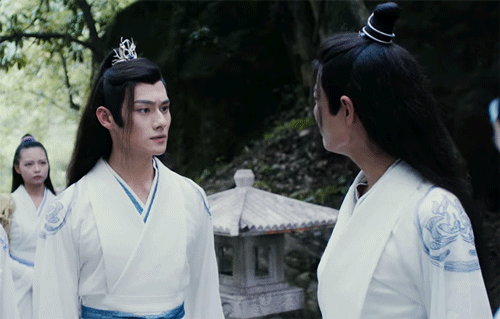
Wei Wuxian demonstrates the purple nurple technique of the Jiang Clan
Should’ve Used Trivago
The Jiang Clan’s reservation got cancelled while they were on the road, so they are going to wander around this small inn for hours being fussed about it, rather than trying another inn. Yes they say the other inns are all full but…so is this one, now.
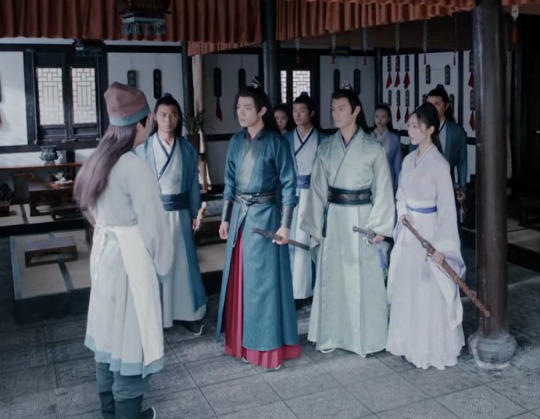
The Jin Clan sends an advance party to fancy up the inn for them.
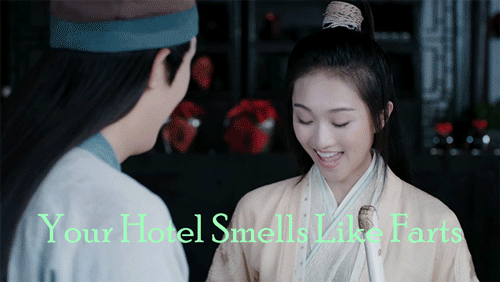
Fuckboi Wei Wuxian
Wei Wuxian decides to use his considerable powers of prettiness to get them a room. He drops some poetry on Mianmian and brazenly flirts with her before shifting to properly introducing himself and asking for a room.
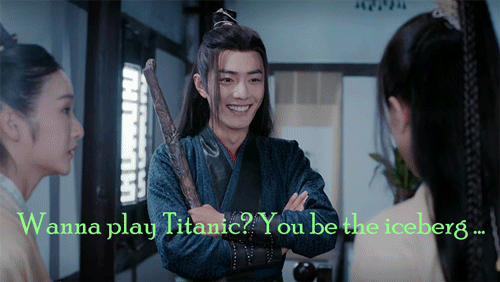
This actually works.

...until her boss shows up.
(Much much more after the cut!)
Worst Person // Best Jin
Jin ZIxuan is an ass and a snob.
I guess we have to give him credit for having a beautiful sidekick and never hitting on her, given that his dad is a rapist and one of his half-brothers is (reputedly) a sex pest and the other half brother is (definitely) an incest perp. But I feel like it doesn’t take much to be the best Jin of his or his father’s generation.

The Jin folks are snobs and talk about how great their fancy and expensive stuff is. It’s an interesting contrast with true connoisseur Nie Huaisang, who loves everything that is fine and beautiful and can quote stacks of poetry off the top of his head, but is not even a little bit of a snob.
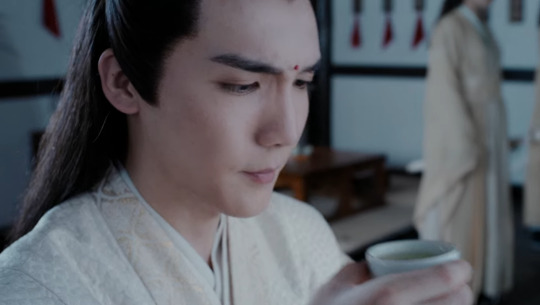
This Tea Smells Like Farts
Ok, let’s talk about generation names in the Jin clan. Ru is the name for Jin Ling’s generation, hence his courtesy name Rulan. The name for the current generation is apparently Zi (子), because both Zixuan and his jerk cousin Zixun have that as their name. Sect Leader Jin Guangshan would seem to be using the generation name Guang, but then names his son Jin Guangyao so…the whole system breaks down.
Anyway, my point here is that even considering generation names, if I had a baby and named it Zixuan, and my sister-in-law promptly had a baby and named it Zixun, I would slap her.
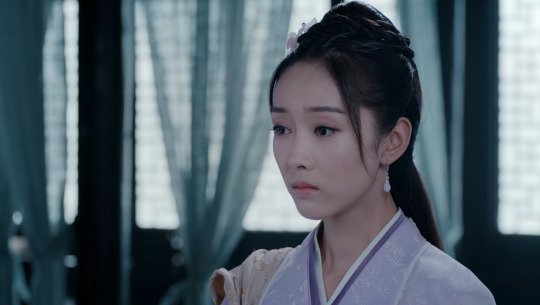
Find you a lover who does not make you feel like this
Jin Zixuan is mildly intrigued by his betrothed, and expresses it by being rude to her in front of Wei Wuxian, starting a chain of events that will culminate with Wen Ning’s fist going all the way through Jin Zixuan’s chest.
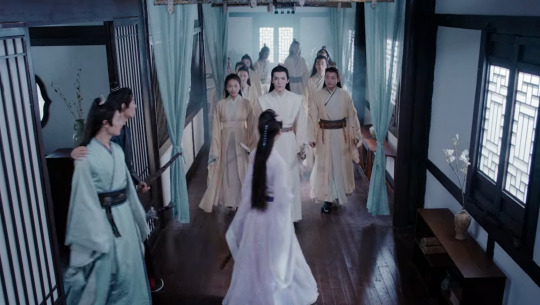
Side Note: Look at these young Jiang Brothers and their casual shoulder hugs. Sigh.
Wei Wuxian’s Combat PlayBook
When Wei Wuxian wants to throw down, he starts with smack talk, moves along to boundary crossing, then to direct threats, and then brings out a weapon if he hasn’t won already.
Here he starts shit with Jin Zixuan by complaining at him for taking up too much space and having too many sycophants. Then he goes for the unwelcome shoulder touch.
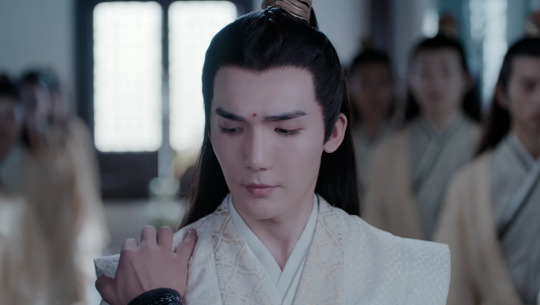
Having been sufficiently provocative to get someone to draw a sword and threaten him with physical violence, he shifts to formal verbal sparring.
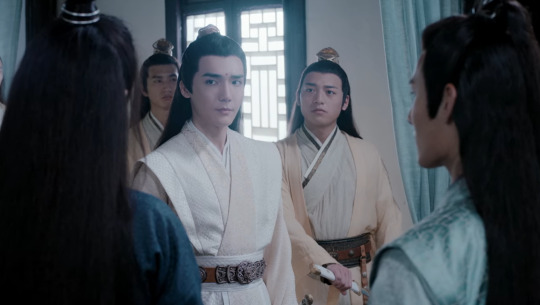
This gets the other guy to back down, because even at this age no-one actually wants to tangle with Wei Wuxian, and Wei Wuxian gets to claim the moral advantage, although he still doesn’t get to keep his hotel room.
Actually Not A Fan of My Sister’s Betrothal
Jin Zixuan and Jiang Yanli have the first of many, many moments of heterosexual ineptitude together. Wei Wuxian quickly rescues them.
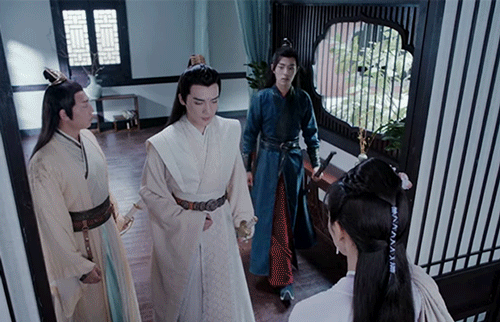
Hi, I’m Young Master Cockblock.
Neither of the boys understands what Yanli sees in Zixuan and neither do I, at this juncture. He does improve later after multiple beatings from Wei Wuxian.
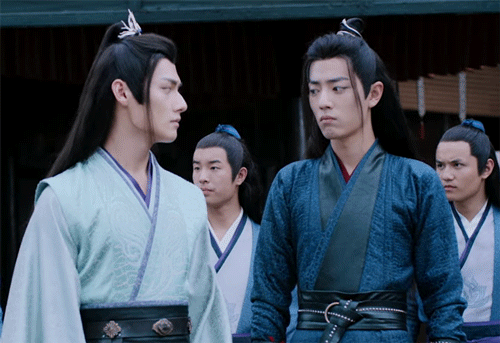
This Is The Day Your Life Will Surely Change
Yanli’s encounter in the Inn is the first step toward the inexorable end of the three of them as a unit, although it’s still a long ways off. They are all growing up and she and Wei Wuxian are both going to fall in love at summer camp, like in a 1980s teen movie but without the virginity betting (presumably).
Meanwhile poor Jiang Cheng is going to be swept along just trying to keep up with events, which becomes the story of his life for the next two decades.
Welcome to Transylvania
We meet Wen Ruohan. He is boring and he sucks. Also I’m summarizing the Transylvania parts out of order because they break up the rhythm of the story. And are boring and suck.
We meet Xue Yang. He seems nice.
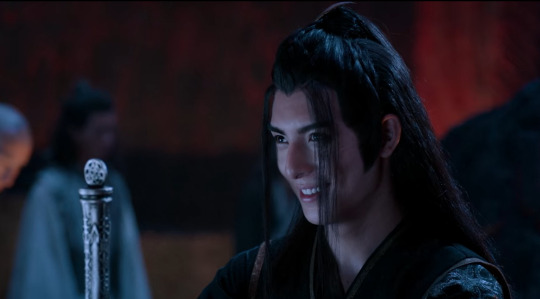
Wen Ruohan’s living room is like a shitty nightclub where everyone is too drunk to dance except Xue Yang.
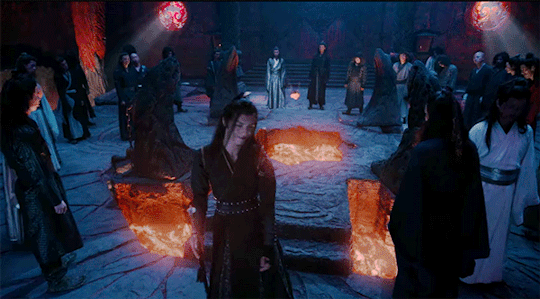
Dee Jay: Undead undead undead, Bela Lugosi’s dead
[OP can’t get a video to embed in this post with looping enabled, so the alternate version of this joke has its own post right here. That will teach OP to get fancy.]
Anyhoo
We meet Wen Qing. She is the bestest most wonderful girl in the world but this isn’t actually when we find that out.
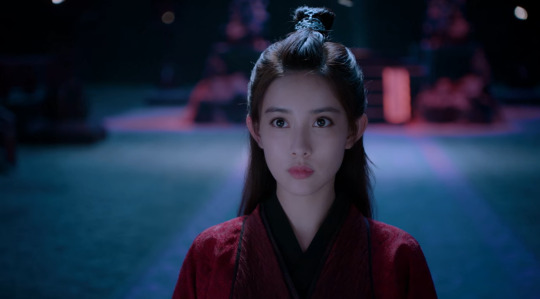
Right now we just find out that she is absurdly pretty, that she loves her brother deeply, and that she is helping Wen Ruohan with his “take over the world by murdering cultivators” project. OKAY, PROBLEMATIC, BUT SHE IS THE BESTEST GIRL OKAY?
Gatekeeping
The Jiang Clan don’t get another inn but they do manage to change into immaculate white robes while they’re out on the street, so - nice work, Jiang Clan. Be free!
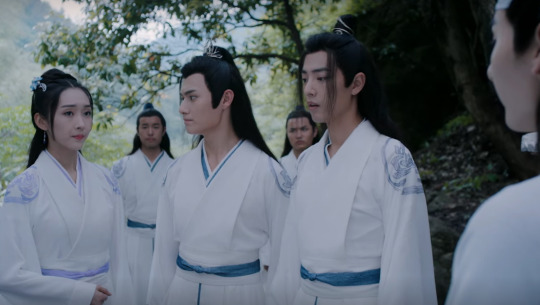
They get stuck outside the gate because they don’t know that the secret to getting into Cloud Recesses is to set the gate guard on fire.
Walking Thirst Trap Hanguang-Jun
Lan Wangji shows up and everyone except Yanli, who is already in love with Sir Golden Pants, makes thirst faces at him. Including Jiang Cheng tho he will never admit it. One girl in the background is actually biting her knuckle.
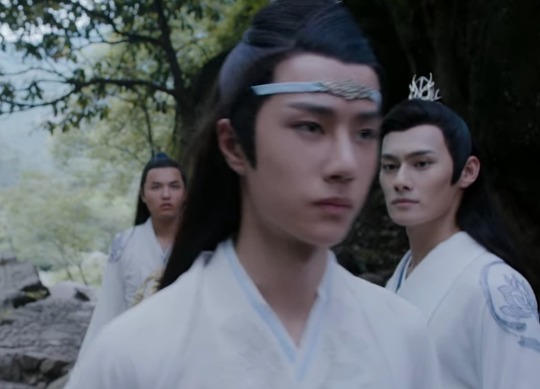
Note: Lan Wangji knows exactly how fine he is. Look at his fucking hairstyle.
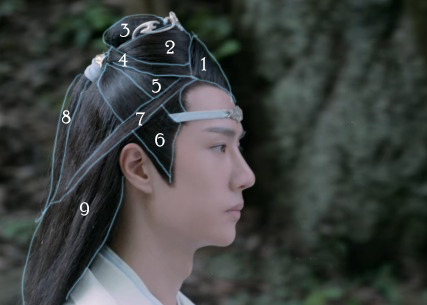
He is sixteen years old. The only person in the entire cultivation world with fancier hair is Nie Mingjue, and that’s because he indulges his dìdi’s braiding hobby.
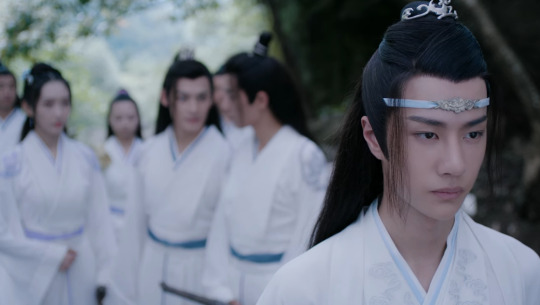
Wei Wuxian loudly stage whispers that LWJ is their key to getting in and LWJ is is like, not fucking likely, person I didn’t glance at yet.
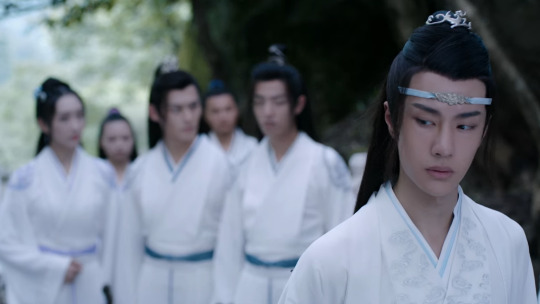
But then Wei Wuxian says a smart cultivator thing about the puppet dude, and Lan Wangji turns around and has the first of many long mutual staring sessions with this boy he totally isn’t going to like at all.
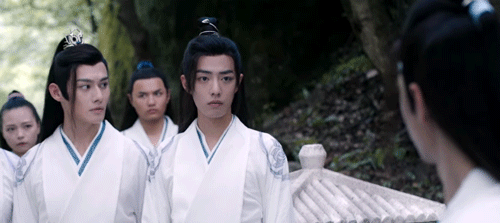
Jiang Cheng has a bad feeling about the future: a 2-frame gif
Unrelated gardening note: the red-crack puppet is more commonly grown in Gusu and Dafan, while the black-line puppet is native to Yiling

I Must Arrange a Date with this Uninteresting Boy
The rest of the evening is a series of tests that Lan Wangji puts Wei Wuxian through. Wei Wuxian doesn’t know this and Lan Wangji probably doesn’t exactly know it either.
First he sends WWX back to town to get the invitation. Yes, go get it. Not your entourage; YOU, talky person who thinks he can manipulate me and is smart and looks...intriguing. Go find it and come back.
When Wei Wuxian complains, Lan Wangji silences him, which is literally the most boss move he could have used on smooth talking Wei Wuxian.

You tried, Fuckboi.
Would you like to try some more because I think I would like you to try some more
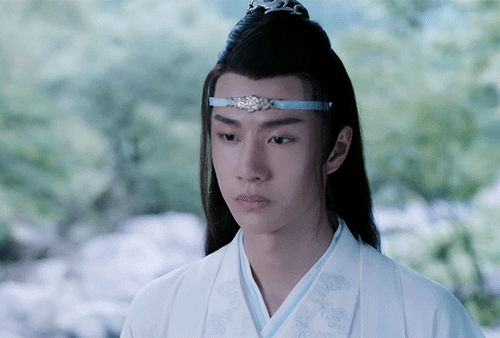
Jiang Cheng is the Better Baby Brother
Sorry, he just is. Wei Wuxian is all about being taken care of and adoring Yanli without actually doing much for her. Jiang Cheng is the one who thinks about her feelings and giving her what she needs, even to the point of arranging that wedding rehearsal dinner so she can be with her favorite brother again -- the favorite who isn’t him, much as she also loves him.
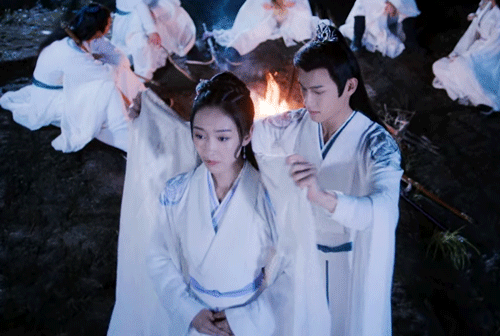
Date Test 1: Can You Get In.
Once Wei Wuxian is definitely gone, Lan Wangji shows up again and collects the entire retinue, guaranteeing that Wei Wuxian will be stranded outside the gate when he gets back. LWJ doesn’t wait by the gate; he goes and waits up on the roof instead of going to bed or whatever else he’s supposed to be doing. Because he already knows the route Wei Wuxian will be taking.
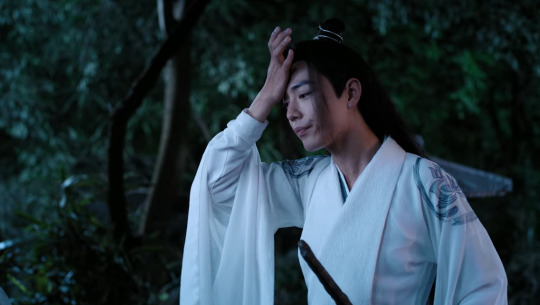
Wei Wuxian passes the “get in through the wards” test with no problem besides a minor headache and bent fingers.
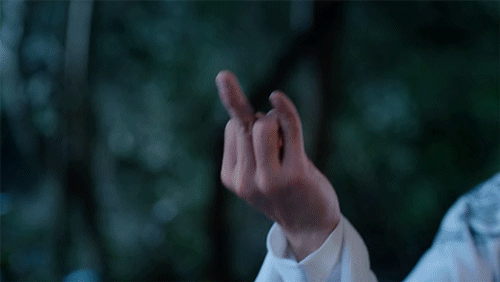
Is that Xiao Zhan’s hand or did they use a double-jointed hand model?
Date Test 2: Fight Me (Lan Wangji’s Combat Playbook)
As soon as Wei Wuxian shows up on the roof, Lan Wangji picks a fight with him.
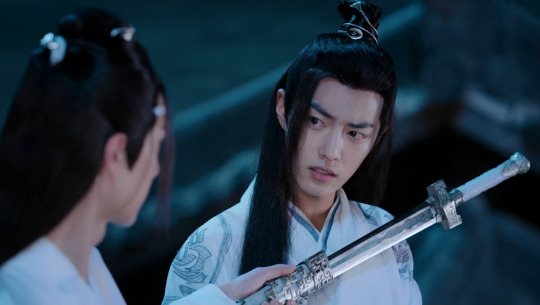
LWJ fights all the time; he’s perfectly comfortable when he’s fighting and it’s a good venue for him to express himself. His style is graceful and aggressive.
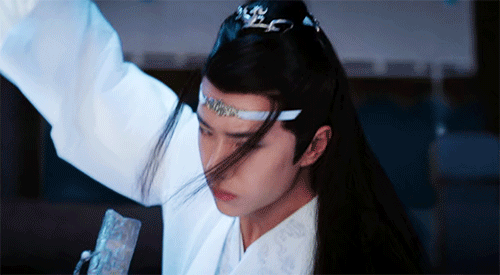
Attack attack attack strike a pose, vogue, you know it.
He starts by going all in on swordplay, but that doesn’t gain him the advantage; Wei Wuxian fends him off without ever drawing his sword. Which is probably the hottest thing that has ever happened to Lan Wangji in his young life.
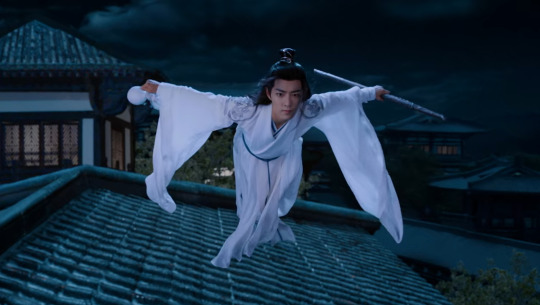
Do you like me better when I’m horizontal?
Next Lan Wangji deploys the pettiness by breaking WWX’s wine. Then when Wei Wuxian starts insulting him he upgrades to next level pettiness by dropping another silence spell, this time with the added bonus of preventing WWX from drinking.
Wei Wuxian’s Combat Playbook, Redux
Meanwhile Wei Wuxian is running his own fight routine, starting with a charm attack, which doesn’t work at all.
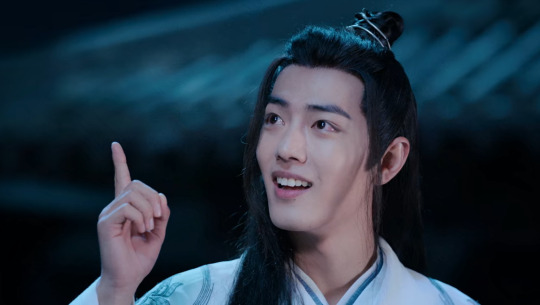
Are you admiring the moon?
He keeps trying to de-escalate for the first phase of their fight, until they reach a pause and he reflects that Lan Wangji has real skills. As soon as he makes that determination he goes on the offensive - with words.
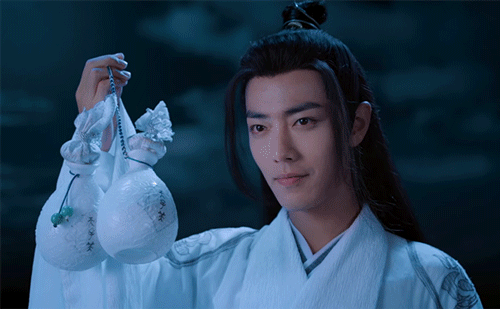
He very formally says he’s too busy to continue fighting, and turns away, which is a pretty solid roast when you say it to someone who’s been trying really hard to kick your ass. Then he continues defending easily until Lan Wangji uses the wine against him.
At this point the gloves come off, with Lan Wangji lecturing Wei Wuxian, Wei Wuxian making ad hominem attacks, Lan Wangji forcibly shutting him up...
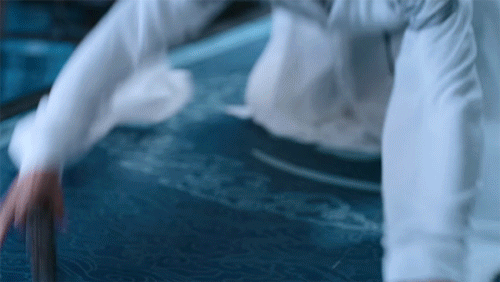
...and then throwing him on the floor in front of Lan Qiren and Lan Xichen.
Sincere Grief for the Death of our Colleague
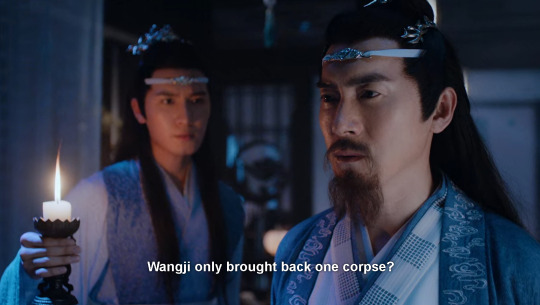
Lan Qiren and Lan Xichen feel really bad for their disciple who has been horribly turned into an undead creature. Ha ha j/k
Date Test 3: Face the Authorities
Lan Wangji gets to pick Wei Wuxian’s punishment. This probably won’t awaken anything in him.
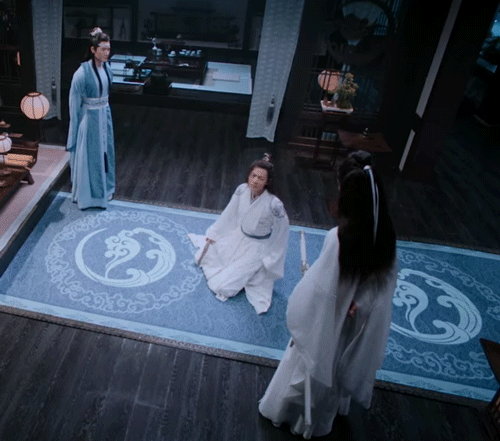
Surprise surprise, Wei Wuxian actually passes the Authority test with flying colors. Lan Qiren doesn’t like him, but listens respectfully to his thoughts about the undead cultivator. And Lan Xichen clearly does like him.
When Wei Wuxian learns that Lan Wangji was nice to his sister, his entire demeanor changes, to such an enormous degree that Lan Wangji starts to run away.
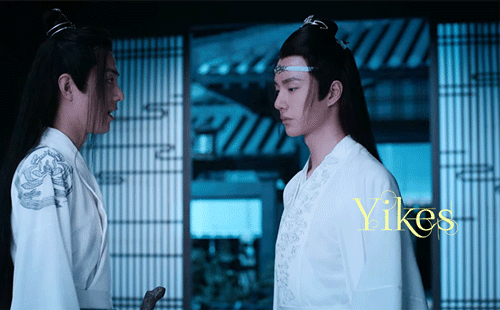
He’s not going to let this boy (who has passed all the tests oh no he passed all the tests) make out with him in front of his family like he is obviously planning.
But once again, Wei Wuxian’s cultivation knowledge captures Lan Wangji’s attention and breaks through his reserve.
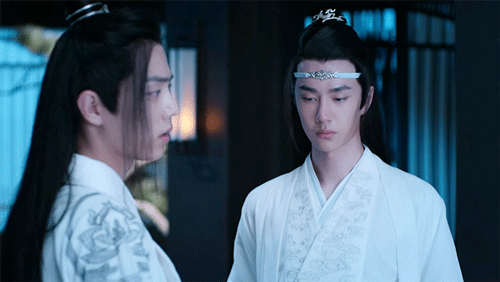
This Hardy Boys moment is the beginning of their cultivation partnership.
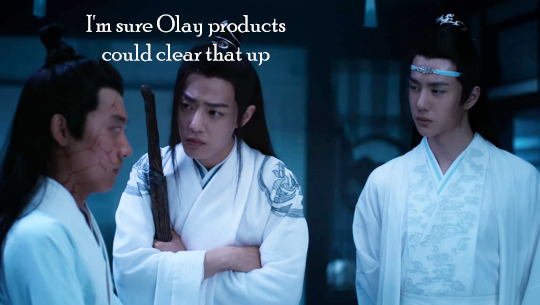
Lan Wangji is brave but is extremely constrained: by the authorities in his life and by his own rigid reserve. Wei Wuxian is brave and is also free. His companionship gives Lan Wangji an opportunity to engage with a much broader range of the things that interest him than he’s ever had before.
After Wei Wuxian has been sent to bed, Lan Wangji stands outside and -- just as WWX had suggested at the beginning of their date/fight -- admires the moon, with an expression that’s anything but upset.
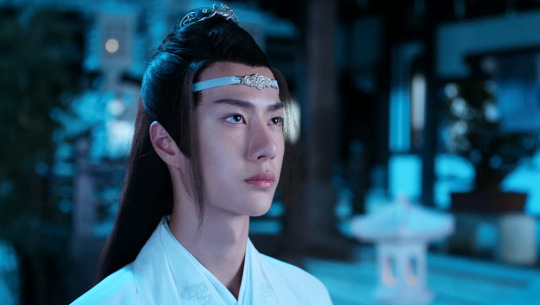
Sure, sex is cool (probably), but have you ever analyzed a walking corpse with a beautiful boy in the moonlight?
If you’ve got your true honey Life can be pretty funny If you've got money, money to burn Rooty toot toot for the moon It's the biggest star I've ever seen
The Fine-as-Hell Brothers
Alone together, Lans Xichen and Wangji talk over the various things on their minds.
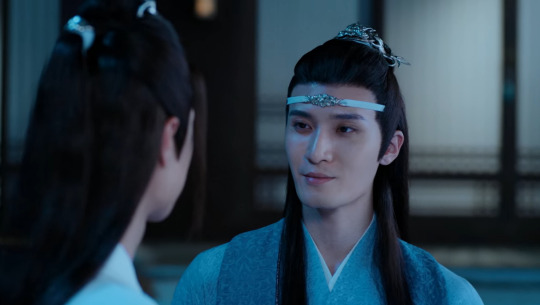
Xichen: What the fuck is up with you? ...Rooftop fights and dropping spells on boys?
Wangji: You and uncle were ignoring me so I was making my own fun
Xichen: Yeah, we are dealing with this zombie situation; shit’s going to hit the fan
Wangji: what are you going to do about it?
Xichen: fuck-all
Wangji: Well, you can rely on me
Xichen: I totally do. So how about you get to know this Wei kid, he seems like a fun ride.
Wangji: *death glare*
Xichen: You know, since Dad died you’ve become even more uptight. I wonder if I’ve been too strict with you?
Wangji: Um, you think? 3000 fucking rules, dude. Fortunately I’m not going to go off the rails and fall in love with my polar opposite and cause havoc in the cultivation world or anything like that.
Xichen: good, me neither

Outtro
Writing prompt: Lan Xichen’s secret nightly letter to his Mom’s memory or spirit (your choice), in which he confides in her about his day. May be written in flute solo form.
(As always if you use this prompt feel free to post a link to your fic in comments!)
Soundtrack: 1. This Is The Day by The The 2. Bela Lugosi’s Dead by Bauhaus 3. Rooty Toot Toot for the Moon, Greg Brown version 4. Madonna, Vogue
Bonus: FineAsHell-Jun
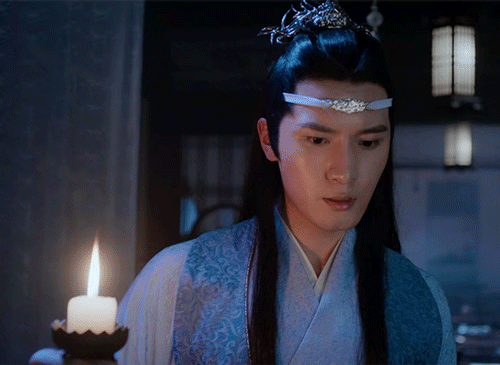
Episode 04 Restless Rewatch coming soon!
#fytheuntamed#the untamed#wangxian#chen qing ling#c-drama#the untamed spoilers#the untamed gifs#the untamed stills#my gifs#my stills#restless rewatch#restless rewatch the untamed#wei wuxian#lan xichen#lan wangji#jin zixuan#rooty toot toot for the moon#cql#bl drama#the untamed memes
475 notes
·
View notes
Text
Kingdom Hearts Final Mix Recap: Another side, Another story
The brains behind Kingdom Hearts weren't sure that they'd get a sequel greenlit, given that it required a collaboration between Squaresoft and Disney.
So, aside from the (very risky) cliffhanger ending, they ALSO added in a Secret Ending that completionists could unlock, as a sort of "proof of concept" video to try and generate fan demand for a sequel, in order to show Disney that there was MORE money to be made in this collaboration.
The result?
"Another side, Another story" a secret cutscene you can only view by meeting certain criteria. The higher the difficulty, the easier it is to unlock.
The Unlock Criteria in the original are as follows:
Standard Difficulty: Complete the Hades Cup, find all 99 puppies, seal every Keyhole.
Expert Difficulty: Seal every Keyhole.
The Unlock Criteria in the Final Mix release are as follows:
Final Mix: Beginner Difficulty: N/A. This is the one game in the series to engage in Easy Mode Mockery by locking you out of the secret ending, since they had already gotten a sequel greenlit AND Disney had a pilot episode for a TV Adaptation in the works (it never got off the ground, sadly).
Final Mix Difficulty: Seal every Keyhole and find all 99 Puppies.
Final Mix: Proud Difficulty: Defeat the World of Chaos.
"Another side, Another story" goes as follows:
A figure in a black coat walks through the in a dark city. He looks up to the screen, and then finds himself surrounded by Heartless that look like larger, thinner, lankier Shadows, with a Xenomorph-like stance.
(The Final Mix release would make these guys into regular enemies you can find when returning to the Linked Worlds room in the End of the World, dubbing them "Neoshadows". They've become a staple of the series since then.)
A blindfolded Riku, also wearing a black coat, looks down on the other figure.
The black-coated figure draws two Keyblades, Oathkeeper in his left hand, Oblivion in his right, and spins them above his head.
Riku looks up and reaches for the sky, the clouds parting to reveal a meteor shower.
A heartless Emblem's outline surrounds the figure on the ground while Riku removes his blindfold and throws his head back, the figure on the ground mouthing something:
"Where's Sora?"
"We'll go together."
KINGDOM HEARTS
On a beach, an older Kairi with long hair watches a single meteor fall from the sky.
(Credit to KHWiki, they did just a good job at recording this that all I needed to do was censor the name of the character who doesn't appear in Kingdom Hearts I, because his name would mean NOTHING to you without context.)
When the international version was ported back to Japan, they added the following:
An easy mode (Final Mix: Beginner), the Unknown, numerous story cutscenes, the final three parts of Ansem's report (11, 12, and 13), and an extended version of the secret ending, titled "Another side, Another story [deep dive]".
When unlocked, it replaces the original Secret Ending.
You also can't unlock it in Final Mix: Beginner, but you can unlock it with the following criteria in the other difficulties:
Final Mix Difficulty: Complete Jiminy's Journal
Final Mix: Proud Difficulty: Seal every Keyhole and complete the Hades Cup.
Unlike with the previous ending, the developers had a more solid idea on where they wanted to take the series, and as such it's a closer representation to what actually happens in the next two games, with several scenes from those games being recreations of moments depicted in this ending:
I'm using KHWiki as a reference to refresh my memory again, but as more happens in this secret ending I have more room to paraphrase and summarize.
Regardless, it plays out as follows:
Sora stands at a crossroads in the unknown world from before, looking up at the sky.
Utter Silence.
A letter in a bottle washes up on a dark and evil looking beach as the wave recedes.
A fragmented tale
A world without you
The eyes will close
A Heartless Emblem on a rock turns into a dark portal that Two Keyblades Guy from the previous ending steps out of, one of the eyes under his hood flashing yellow as he steps forward.
Something so natural
In the dark city from the original secret ending, Two Keyblades Guy walks towards the skyscraper. Clashing blades sound, and he's suddenly surrounded by Heartless and wielding the aforementioned two Keyblades that inspired me to give him this nickname. Two Keyblades Guy kills three of the Neoshadows.
The memory beyond
He slashes through more with his Keyblade, kicks a couple more away. Three of the Neoshadows lung at Two Keyblades guy, who backflips out of the way, causing the Neoshadows to land on and kill each other instead, dissolving into darkness. More leap up into the air, and Two Keyblades Guy throws Oathkeeper, which slashes through four of them before returning to Two Keyblades Guy, who in turn backflips onto the skyscraper's porch.
Other Neoshadows begin crawling on the tower's gargoyles, and Two Keyblades guy looks out at the horde, then up at the skyscraper's screens.
Something so simple
Riku stands up on top of the screen and smirks at Two Keyblades Guy, who smirks back, and jumps onto a post and begins running up the side of the skyscraper with Oathkeeper and Oblivion at his sides, cutting through any Neoshadow that tries to stop him. Riku walks to the edge of the screens.
XII
"Where's Sora?"
"We must find him..."
Two Keyblades Guy yeets Oblivion at the Neoshadows, slicing through them as Riku jumps off of the screen.
12
[Ansem's other report]
"A creation born of ignorance."
Riku catches Oblivion after it slices through one more Neoshadow and turns his body so it is parallel to the skyscraper, and three more Neoshadows leap after him.
11
Behind the Darkness =\= Door to the Light
The two approach the skyscraper's largest screen, Two Keyblades Guy, now holding the Kingdom Key instead of Oathkeeper, runs past the bottom of the central screen.
X
The secret place
"His voice... It left me."
"This time... I'll fight."
The two pass each other, briefly glancing each other before going on their way, Kairi appearing on the screen as Riku passes it.
Three rays of light pierce the cloud cover.
9
The world between = A forgotten world
The gathering
Two Keyblades Guy mouth's something as he and Riku keep doing what they're doing.
VIII
The third enemy = Nobody "Who is Nobody, you ask? They are the nonexistent ones."
Two Keyblades Guy flashes back to the Dive to the Heart portion of the game.
VII
ENDLESS
"What took you so long, Kairi?"
"Can we do it? Against that?"
More flashes of Sora's Memory back on the dark and evil beach as the hooded figure approaches the Unknown, who's sitting on a rock.
HEARTLESS
"We have come for you, my liege."
"You are the source of all Heartless."
6
The Thirteenth Order
"Sora?"
"Sora... Why?"
"Your Highness! But why?"
An older Kairi (still sporting a design that will never be used again), watches a meteor shower on Destiny Islands.
5
Change - The third key
Riku plummets to the ground.
4
End of the world
"What is this place?"
"Is this the answer you've been looking for?"
"This is the world in it's true form."
"Maybe our journey meant nothing after all."
3
Paradise
Kairi reaches Sora.
II
A black-coated Mickey flips through the air, lands in an action pose atop the Skyscraper, and wields the Kingdom Key D.
KINGDOM HEARTS
"I went to see him."
Back at the dark and evil looking beach, Two Keyblades Guy approaches the Unknown, who turns to speak to him.
"He looks a lot like you."
Sora flies over an endless ocean, seemingly asleep, under a cloudy sky.
"Everything is coming back to me, the true..."
Regardless of if you unlocked either Secret Ending or not, the game ends on "The End" a special screen that tallies up your completion and displays a hand-painted/drawn illustration (the illustration depends on the difficulty), while a reprise of the main menu theme plays. In the first game and its Final Mix release you'll eventually be returned to the title screen.
And that's it for the first game's story content. The next game released on the Nintendo Gameboy, Kingdom Hearts: Chain of Memories, which got a PS2 remake after Kingdom Hearts II was released.
And for the record, Kingdom Hearts II isn't the next main series title.
No, the Gameboy game was the next chapter of Sora's story, and Kingdom Hearts II will be very confusing if you happened to skip it.
It's a baffling decision, but one we have to live with.
-
I know enough about the future games to catch some important info there!
Also I will never understand why they made the order of the games so fucked.
5 notes
·
View notes